Featured Profiles
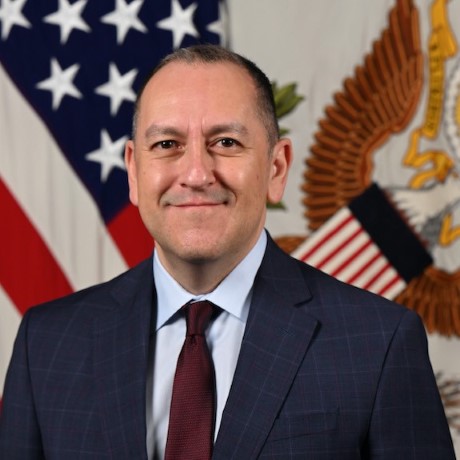
Under Secretary of the Army
Gabe Camarillo
2022: 35th Under Secretary of the Army
READ MOREGabe Camarillo
 2022: 35th Under Secretary of the Army
2022: 35th Under Secretary of the Army
The Honorable Gabe Camarillo was confirmed by the U.S. Senate on February 3, 2022 and sworn in as the 35th Under Secretary of the Army on February 8, 2022. As the Under Secretary of the Army, Mr. Camarillo serves as the Army’s Chief Operating Officer and Chief Management Officer, helping oversee a budget of more than $170 billion and sharing responsibility for the manning, training and equipping of more than 970,000 Soldiers across the active, Guard and Reserve components. Mr. Camarillo is also responsible for the Army’s enterprise management and business operations as well as budget development and execution.
Mr. Camarillo’s prior career includes significant experience in law, government, national security and private industry. Mr. Camarillo previously served as Assistant Secretary of the Air Force (Manpower & Reserve Affairs) where he was responsible for military and civilian personnel and reserve component matters for the Air Force. He previously also served as the Principal Deputy Assistant Secretary of the Army (Acquisition, Logistics & Technology), helping to lead and supervise Army modernization programs, procurement, logistics and R&D investment.
His private sector experience includes legal practice at several law firms with emphasis in the areas of commercial litigation, campaign finance law and government ethics. Mr. Camarillo also taught campaign finance law as an adjunct professor at Georgetown University’s McCourt School of Public Policy. Recently, Mr. Camarillo served as Senior Vice President at SAIC, where he led two business units for an engineering and IT services company.
Mr. Camarillo received a Bachelor of Arts in Government at Georgetown University and a law degree from Stanford University.
Related Articles
Under Secretary of the Army – Leader's Page
Under Secretary of the Army Gabe Camarillo
2022: 35th Under Secretary of the Army
The Honorable Gabe Camarillo was confirmed by the U.S. Senate on February 3, 2022 and sworn in as the 35th Under Secretary of the Army on February 8, 2022. As the Under Secretary of the Army, Mr. Camarillo serves as the Army’s Chief Operating Officer and Chief Management Officer, helping oversee a budget of more than $170 billion and sharing responsibility for the manning, training and equipping of more than 970,000 Soldiers across the active, Guard and Reserve components. Mr. Camarillo is also responsible for the Army’s enterprise management and business operations as well as budget development and execution.
Mr. Camarillo’s prior career includes significant experience in law, government, national security and private industry. Mr. Camarillo previously served as Assistant Secretary of the Air Force (Manpower & Reserve Affairs) where he was responsible for military and civilian personnel and reserve component matters for the Air Force. He previously also served as the Principal Deputy Assistant Secretary of the Army (Acquisition, Logistics & Technology), helping to lead and supervise Army modernization programs, procurement, logistics and R&D investment.
His private sector experience includes legal practice at several law firms with emphasis in the areas of commercial litigation, campaign finance law and government ethics. Mr. Camarillo also taught campaign finance law as an adjunct professor at Georgetown University’s McCourt School of Public Policy. Recently, Mr. Camarillo served as Senior Vice President at SAIC, where he led two business units for an engineering and IT services company.
Mr. Camarillo received a Bachelor of Arts in Government at Georgetown University and a law degree from Stanford University.
Related Articles
Under Secretary of the Army – Leader's Page
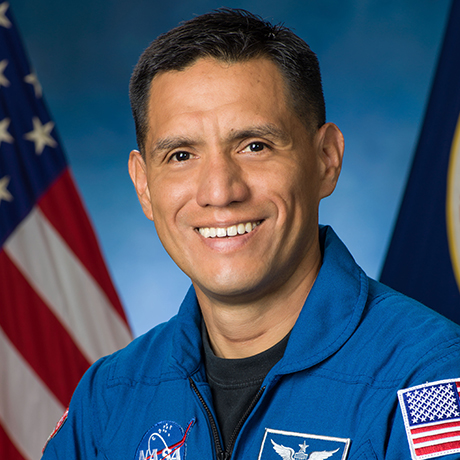
Lieutenant Colonel
Frank Rubio
2017: First Hispanic American U.S. Army Astronaut
READ MOREFrank Rubio
 2017: First Hispanic American U.S. Army Astronaut
2017: First Hispanic American U.S. Army Astronaut
Born in Los Angeles, California — but considering Miami, Florida home — Lt. Col. Frank Rubio is currently one of three Soldiers providing support to NASA through the U.S. Army Space and Missile Defense Command's NASA Detachment.
Rubio was selected by NASA to join the 2017 Astronaut Candidate Class and reported for duty in August 2017. He launched into space for the first time aboard Soyuz MS-22 on September 21, 2022 and will land in September 2023 — marking the longest single duration spaceflight for a U.S. astronaut.
Rubio graduated from the U.S. Military Academy in 1998 and earned a Doctorate of Medicine from the Uniformed Services University of the Health Sciences in 2010. Prior to attending medical school, he served as a UH-60 Black Hawk helicopter pilot and flew more than 1,100 hours, including more than 600 hours of combat and imminent danger time during deployments to Bosnia, Afghanistan and Iraq. Rubio is a board-certified family physician and flight surgeon. At the time of his selection, he was serving in the 10th Special Forces Group (Airborne) at Fort Carson, Colorado.
Related Articles
NASA — Astronaut Frank Rubio
USASMDC — NASA Astronaut Detachment
Lieutenant Colonel Frank Rubio
2017: First Hispanic American U.S. Army Astronaut
Born in Los Angeles, California — but considering Miami, Florida home — Lt. Col. Frank Rubio is currently one of three Soldiers providing support to NASA through the U.S. Army Space and Missile Defense Command's NASA Detachment.
Rubio was selected by NASA to join the 2017 Astronaut Candidate Class and reported for duty in August 2017. He launched into space for the first time aboard Soyuz MS-22 on September 21, 2022 and will land in September 2023 — marking the longest single duration spaceflight for a U.S. astronaut.
Rubio graduated from the U.S. Military Academy in 1998 and earned a Doctorate of Medicine from the Uniformed Services University of the Health Sciences in 2010. Prior to attending medical school, he served as a UH-60 Black Hawk helicopter pilot and flew more than 1,100 hours, including more than 600 hours of combat and imminent danger time during deployments to Bosnia, Afghanistan and Iraq. Rubio is a board-certified family physician and flight surgeon. At the time of his selection, he was serving in the 10th Special Forces Group (Airborne) at Fort Carson, Colorado.
Related Articles
NASA — Astronaut Frank Rubio
USASMDC — NASA Astronaut Detachment
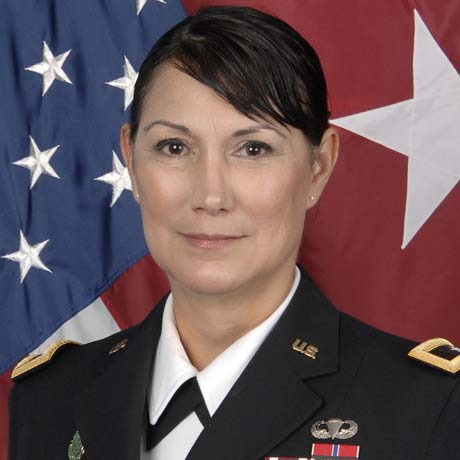
Brigadier General
Irene M. Zoppi Rodríguez
2017: First Hispanic American Woman promoted to general in the U.S. Army Reserve
READ MOREIrene M. Zoppi Rodríguez
 2017: First Hispanic American Woman promoted to general in the U.S. Army Reserve
2017: First Hispanic American Woman promoted to general in the U.S. Army Reserve
Brig. Gen. Irene Zoppi is the first Puerto Rican woman promoted to the rank of general in the U.S. Army Reserve. She received the star during her promotion ceremony at Fort Meade on Aug. 28, 2017, as the deputy commanding general for the 200th Military Police Command, the largest military police organization in the Department of Defense.
A native of Canóvanas, Puerto Rico, Brig. Gen. Zoppi began her military career as a private first class in 1985 with the Military Police Corps at Ft. McClellan, Alabama. In 1988, she commissioned as a second lieutenant after graduating from the University of Puerto Rico, Rio Piedras Campus. Her numerous leadership assignments include deputy commander for Readiness, Mission Support Element under the 200th Military Police Command; deputy commander & chief of staff, 1st Mission Support Command; group/brigade commander, Strategic Intelligence Group; battalion commander, 203rd Military Intelligence Battalion (Technical Intelligence); assistant J2, chief intelligence officer, Joint Task Force, National Capital Region, NORTHCOM; battalion commander, 11th Battalion, 3rd Brigade, 104th Division (Leadership Development) and other key joint assignments including a deployment with the 3rd Armored Division during the Gulf War.
Brig. Gen. Zoppi is a graduate of the U.S. Army War College, Advanced Joint Professional Military Education, Command and General Staff College, the Combined Arms Service Staff School and is branched qualified in military police, military intelligence, civil affairs and public affairs. She holds a Doctorate in Philosophy from the University of Maryland, a Master of Strategic Studies Degree from the U.S. Army War College, a Master of Business Administration and a Master of Science in Business, Marketing from Johns Hopkins University. She received a women’s leadership certificate from Harvard Business School. She also holds a Bachelor of Arts in Modern Languages: Italian, French and German from the University of Puerto Rico.
Brig. Gen. Zoppi’s awards and decorations include: Bronze Star Medal, Meritorious Service Medal (with 3 oak leaf clusters), Army Commendation Medal (with 6 oak leaf clusters), Southwest Asia Service Medal (with 3 bronze stars), Kuwait Liberation Medal (Kingdom of Saudi Arabia), Kuwait Liberation Medal (Government of Kuwait) and U.S. Army Parachutist Badge. Brig. Gen. Zoppi also received the Military Intelligence Excellence Knowlton Award in 2013.
As a civilian, Dr. Zoppi serves as a program director for the National Intelligence University under the National Security Agency. She is also a former public school teacher, and has since taught at various universities. She has been a member of the Maryland State Board of Education. On that board, she specializes in helping military families and minority students.
Through it all, Zoppi maintained her Puerto Rican warmth and passion. The passion and love that Zoppi expresses exudes her through every aspect of her life. It's part of her, she said.
Brigadier General Irene M. Zoppi Rodríguez
2017: First Hispanic American Woman promoted to general in the U.S. Army Reserve
Brig. Gen. Irene Zoppi is the first Puerto Rican woman promoted to the rank of general in the U.S. Army Reserve. She received the star during her promotion ceremony at Fort Meade on Aug. 28, 2017, as the deputy commanding general for the 200th Military Police Command, the largest military police organization in the Department of Defense.
A native of Canóvanas, Puerto Rico, Brig. Gen. Zoppi began her military career as a private first class in 1985 with the Military Police Corps at Ft. McClellan, Alabama. In 1988, she commissioned as a second lieutenant after graduating from the University of Puerto Rico, Rio Piedras Campus. Her numerous leadership assignments include deputy commander for Readiness, Mission Support Element under the 200th Military Police Command; deputy commander & chief of staff, 1st Mission Support Command; group/brigade commander, Strategic Intelligence Group; battalion commander, 203rd Military Intelligence Battalion (Technical Intelligence); assistant J2, chief intelligence officer, Joint Task Force, National Capital Region, NORTHCOM; battalion commander, 11th Battalion, 3rd Brigade, 104th Division (Leadership Development) and other key joint assignments including a deployment with the 3rd Armored Division during the Gulf War.
Brig. Gen. Zoppi is a graduate of the U.S. Army War College, Advanced Joint Professional Military Education, Command and General Staff College, the Combined Arms Service Staff School and is branched qualified in military police, military intelligence, civil affairs and public affairs. She holds a Doctorate in Philosophy from the University of Maryland, a Master of Strategic Studies Degree from the U.S. Army War College, a Master of Business Administration and a Master of Science in Business, Marketing from Johns Hopkins University. She received a women’s leadership certificate from Harvard Business School. She also holds a Bachelor of Arts in Modern Languages: Italian, French and German from the University of Puerto Rico.
Brig. Gen. Zoppi’s awards and decorations include: Bronze Star Medal, Meritorious Service Medal (with 3 oak leaf clusters), Army Commendation Medal (with 6 oak leaf clusters), Southwest Asia Service Medal (with 3 bronze stars), Kuwait Liberation Medal (Kingdom of Saudi Arabia), Kuwait Liberation Medal (Government of Kuwait) and U.S. Army Parachutist Badge. Brig. Gen. Zoppi also received the Military Intelligence Excellence Knowlton Award in 2013.
As a civilian, Dr. Zoppi serves as a program director for the National Intelligence University under the National Security Agency. She is also a former public school teacher, and has since taught at various universities. She has been a member of the Maryland State Board of Education. On that board, she specializes in helping military families and minority students.
Through it all, Zoppi maintained her Puerto Rican warmth and passion. The passion and love that Zoppi expresses exudes her through every aspect of her life. It's part of her, she said.
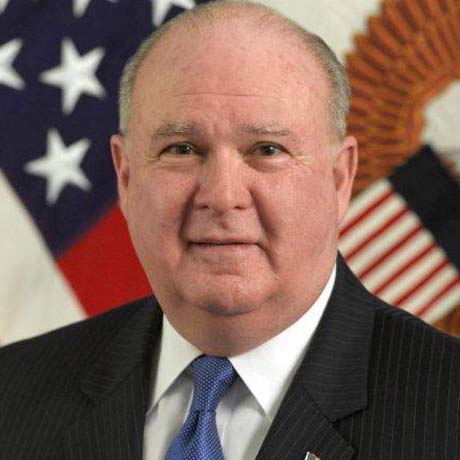
Under Secretary of the Army
Dr. Joseph W. Westphal
2009: First Hispanic Undersecretary of the United States Army
READ MOREDr. Joseph W. Westphal
 2009: First Hispanic Undersecretary of the United States Army
2009: First Hispanic Undersecretary of the United States Army
Dr. Joseph W. Westphal served as the 30th Under Secretary of the Army from September 2009 to March 2014 making his tenure in the position the second longest in U.S. Army history. He was responsible for providing trained and ready forces for combat commanders. The 21st Secretary of the Army John McHugh stated that during Westphal's tenure, the former under secretary contributed to increasing education and professional development for Soldiers, Civilians and Family members; engineered the Army's business transformation as its first chief management officer; advocated and improved diversity and opportunity across the Army; developed and expanded relations with Congress, business and academia; and had been "a tireless advocate" for supporting wounded warriors. Westphal was born in Santiago, Chile, received his bachelor's degree from Adelphi University, his master's degree from Oklahoma State University and his doctorate in political science from the University of Missouri-Columbia.
Related Articles
Army bids farewell to its tireless advocate, Dr. Westphal
Under Secretary of the Army Dr. Joseph W. Westphal
2009: First Hispanic Undersecretary of the United States Army
Dr. Joseph W. Westphal served as the 30th Under Secretary of the Army from September 2009 to March 2014 making his tenure in the position the second longest in U.S. Army history. He was responsible for providing trained and ready forces for combat commanders. The 21st Secretary of the Army John McHugh stated that during Westphal's tenure, the former under secretary contributed to increasing education and professional development for Soldiers, Civilians and Family members; engineered the Army's business transformation as its first chief management officer; advocated and improved diversity and opportunity across the Army; developed and expanded relations with Congress, business and academia; and had been "a tireless advocate" for supporting wounded warriors. Westphal was born in Santiago, Chile, received his bachelor's degree from Adelphi University, his master's degree from Oklahoma State University and his doctorate in political science from the University of Missouri-Columbia.
Related Articles
Army bids farewell to its tireless advocate, Dr. Westphal
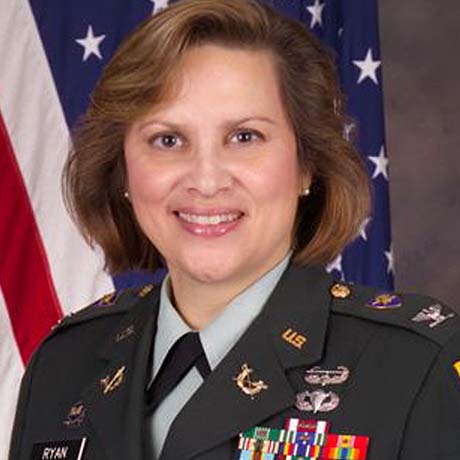
Colonel
Maritza Sáenz Ryan
2006: Head of the Department of Law at the United States Military Academy, “West Point”
READ MOREMaritza Sáenz Ryan
 2006: Head of the Department of Law at the United States Military Academy, “West Point”
2006: Head of the Department of Law at the United States Military Academy, “West Point”
In 2006, Col. Maritza Sáenz Ryan became the First Woman and First Hispanic West Point Department Head. In the late 1970's, Ryan was accepted to West Point as a member of only the third class to include women cadets. She graduated from West Point in 1982 and was commissioned as a Second Lieutenant in Field Artillery. She returned to West Point as a U.S. Military Academy Department of Law professor rising to become head of the law department.
Colonel Maritza Sáenz Ryan
2006: Head of the Department of Law at the United States Military Academy, “West Point”
In 2006, Col. Maritza Sáenz Ryan became the First Woman and First Hispanic West Point Department Head. In the late 1970's, Ryan was accepted to West Point as a member of only the third class to include women cadets. She graduated from West Point in 1982 and was commissioned as a Second Lieutenant in Field Artillery. She returned to West Point as a U.S. Military Academy Department of Law professor rising to become head of the law department.
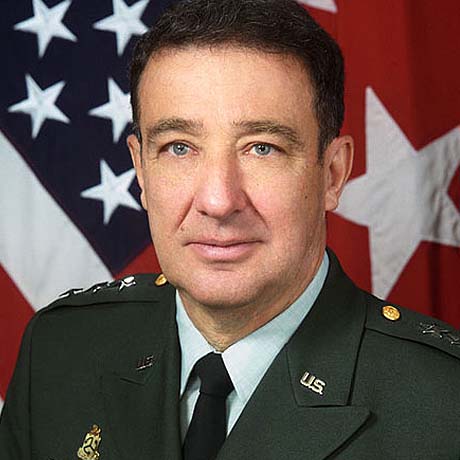
Major General
Edward Baca
1994: First Hispanic to serve as chief of the National Guard Bureau
READ MOREEdward Baca
 1994: First Hispanic to serve as chief of the National Guard Bureau
1994: First Hispanic to serve as chief of the National Guard Bureau
Edward Baca enlisted in the U.S. Army in November of 1956, with the 726th Anti-Aircraft Artillery Battalion of the New Mexico Army National Guard. Upon graduation from Officer Candidate School in July 1962, he was assigned as a platoon leader of the 3631st Maintenance Company. Soon after, he volunteered for Active Duty and for overseas deployment to Vietnam. Baca was released from Active Duty in 1966 and returned to the New Mexico Army National Guard, where he assumed command of the 3631st Maintenance Company. In 1977, Baca became the state military personnel officer and was assigned the state assistant, G-1. A short time later, he was appointed the adjutant general, New Mexico National Guard. Commanding both the Army and Air National Guard of New Mexico, Baca led the state guard to a position of national prominence as a vital component of the "total force." Baca spearheaded a nationwide National Guard force modernization effort and directed the first fielding of the Chaparral and Hawk missile battalions in the U.S. Army Reserve. In October of 1994, Baca was promoted to lieutenant general and assigned as chief, National Guard Bureau, a position he held until his retirement in 1998.
Major General Edward Baca
1994: First Hispanic to serve as chief of the National Guard Bureau
Edward Baca enlisted in the U.S. Army in November of 1956, with the 726th Anti-Aircraft Artillery Battalion of the New Mexico Army National Guard. Upon graduation from Officer Candidate School in July 1962, he was assigned as a platoon leader of the 3631st Maintenance Company. Soon after, he volunteered for Active Duty and for overseas deployment to Vietnam. Baca was released from Active Duty in 1966 and returned to the New Mexico Army National Guard, where he assumed command of the 3631st Maintenance Company. In 1977, Baca became the state military personnel officer and was assigned the state assistant, G-1. A short time later, he was appointed the adjutant general, New Mexico National Guard. Commanding both the Army and Air National Guard of New Mexico, Baca led the state guard to a position of national prominence as a vital component of the "total force." Baca spearheaded a nationwide National Guard force modernization effort and directed the first fielding of the Chaparral and Hawk missile battalions in the U.S. Army Reserve. In October of 1994, Baca was promoted to lieutenant general and assigned as chief, National Guard Bureau, a position he held until his retirement in 1998.
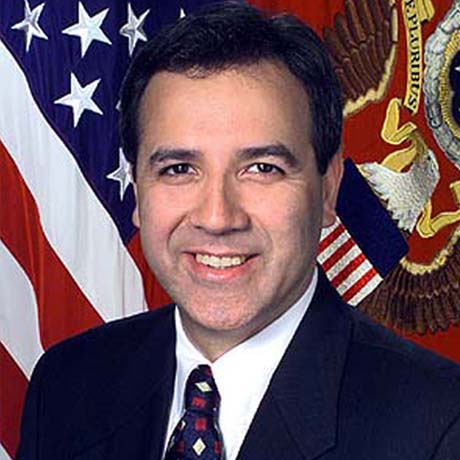
Secretary of the United States Army
Louis Caldera
1998: First Hispanic secretary of the United States Army
READ MORELouis Caldera
 1998: First Hispanic secretary of the United States Army
1998: First Hispanic secretary of the United States Army
Louis Caldera was the 17th United States Secretary of the Army, from July 1998-January 2001. Caldera is of Mexican descent, born on April 1, 1956, in El Paso, Texas. He earned a Bachelor of Science degree in 1978 from the United States Military Academy at West Point, New York, then served on Active Duty from 1978 to 1983, and left as a captain in the U.S. Army. He went on to enroll at Harvard University and in 1987 earned a joint Juris Doctor and Master of Business Administration degree from Harvard Law School and Harvard Business School, respectively.
Secretary of the United States Army Louis Caldera
1998: First Hispanic secretary of the United States Army
Louis Caldera was the 17th United States Secretary of the Army, from July 1998-January 2001. Caldera is of Mexican descent, born on April 1, 1956, in El Paso, Texas. He earned a Bachelor of Science degree in 1978 from the United States Military Academy at West Point, New York, then served on Active Duty from 1978 to 1983, and left as a captain in the U.S. Army. He went on to enroll at Harvard University and in 1987 earned a joint Juris Doctor and Master of Business Administration degree from Harvard Law School and Harvard Business School, respectively.
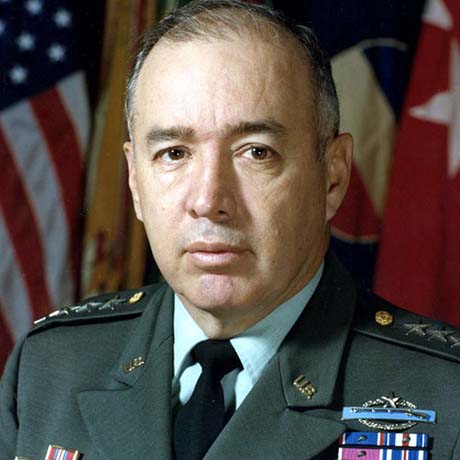
General
Richard E. Cavazos
1982: First Hispanic four-star general
READ MORERichard E. Cavazos
 1982: First Hispanic four-star general
1982: First Hispanic four-star general
Gen. Richard E. Cavazos earned his commission as a distinguished graduate from the ROTC program at Texas Technological University in 1951. During the Korean War, as a member of the 65th Infantry Regiment, Cavazos won the Distinguished Service Cross for his heroic actions during an attack on Hill 142. Later, he attended the U.S. Army Command and General Staff College, the British Staff College and the Armed Forces Staff College. In 1967, Cavazos commanded 1st Battalion, 18th Infantry, in Vietnam. His valiant leadership of that unit in the attack at Loc Ninh earned him a second Distinguished Service Cross. After Vietnam, Cavazos served as commander, 2nd Brigade, 1st Infantry Division, and commander, 9th Infantry Division. In 1980, he became the innovative commander of III Corps. In 1982, Cavazos assumed command of the U.S. Army Forces Command and earned his fourth star, making him the first Hispanic four-star general in the Army. His early support for the National Training Center and involvement in developing the Battle Command Training Program enormously influenced and advanced the Army's warfighting capabilities.
General Richard E. Cavazos
1982: First Hispanic four-star general
Gen. Richard E. Cavazos earned his commission as a distinguished graduate from the ROTC program at Texas Technological University in 1951. During the Korean War, as a member of the 65th Infantry Regiment, Cavazos won the Distinguished Service Cross for his heroic actions during an attack on Hill 142. Later, he attended the U.S. Army Command and General Staff College, the British Staff College and the Armed Forces Staff College. In 1967, Cavazos commanded 1st Battalion, 18th Infantry, in Vietnam. His valiant leadership of that unit in the attack at Loc Ninh earned him a second Distinguished Service Cross. After Vietnam, Cavazos served as commander, 2nd Brigade, 1st Infantry Division, and commander, 9th Infantry Division. In 1980, he became the innovative commander of III Corps. In 1982, Cavazos assumed command of the U.S. Army Forces Command and earned his fourth star, making him the first Hispanic four-star general in the Army. His early support for the National Training Center and involvement in developing the Battle Command Training Program enormously influenced and advanced the Army's warfighting capabilities.
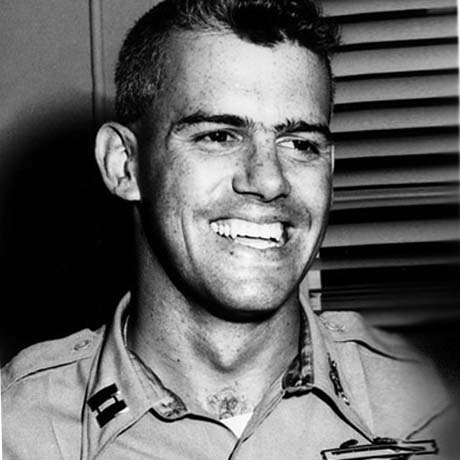
Captain
Humbert Roque 'Rocky' Versace
1965: First member of the U.S. Army awarded the Medal of Honor for actions as a POW
READ MOREHumbert Roque 'Rocky' Versace
 1965: First member of the U.S. Army awarded the Medal of Honor for actions as a POW
1965: First member of the U.S. Army awarded the Medal of Honor for actions as a POW
Capt. Humbert Roque 'Rocky' Versace was of Puerto Rican-Italian descent, who wanted to become a priest and work with Vietnamese orphans. He'd been accepted into a seminary, but his dream was not to be fulfilled. Versace grew up in Norfolk and Alexandria, Virginia, and attended Gonzaga College High School. He graduated from West Point in 1959, and became a member of the Ranger Hall of Fame at Fort Benning, Georgia, and a member of U.S. Army Special Forces. Two weeks before he was due to return home, Versace, 27, was captured, Oct. 29, 1963, by Viet Cong guerrillas, who spent the next two years torturing and trying to brainwash him. In return, he mounted four escape attempts, ridiculed his interrogators, swore at them in three languages — English, French and Vietnamese — and confounded them as best he could, according to two U.S. Soldiers captured with him. The Viet Cong tortured prisoners to persuade them to confess to phony crimes. Versace gave only his name, rank and serial number as required by the Geneva Convention. He cited the treaty chapter verse over and over again. The witnesses said the unbroken Versace sang "God Bless America" at the top of his lungs the night before he was executed, Sept. 26, 1965. His remains have never been recovered.
Captain Humbert Roque 'Rocky' Versace
1965: First member of the U.S. Army awarded the Medal of Honor for actions as a POW
Capt. Humbert Roque 'Rocky' Versace was of Puerto Rican-Italian descent, who wanted to become a priest and work with Vietnamese orphans. He'd been accepted into a seminary, but his dream was not to be fulfilled. Versace grew up in Norfolk and Alexandria, Virginia, and attended Gonzaga College High School. He graduated from West Point in 1959, and became a member of the Ranger Hall of Fame at Fort Benning, Georgia, and a member of U.S. Army Special Forces. Two weeks before he was due to return home, Versace, 27, was captured, Oct. 29, 1963, by Viet Cong guerrillas, who spent the next two years torturing and trying to brainwash him. In return, he mounted four escape attempts, ridiculed his interrogators, swore at them in three languages — English, French and Vietnamese — and confounded them as best he could, according to two U.S. Soldiers captured with him. The Viet Cong tortured prisoners to persuade them to confess to phony crimes. Versace gave only his name, rank and serial number as required by the Geneva Convention. He cited the treaty chapter verse over and over again. The witnesses said the unbroken Versace sang "God Bless America" at the top of his lungs the night before he was executed, Sept. 26, 1965. His remains have never been recovered.
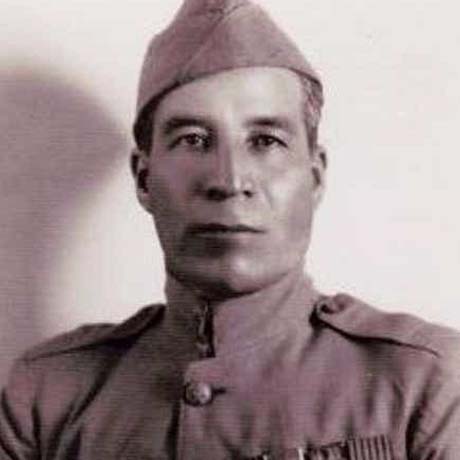
Private
Marcelino Serna
1918: First Hispanic to be awarded the Distinguished Service Cross for actions in World War I
READ MOREMarcelino Serna
 1918: First Hispanic to be awarded the Distinguished Service Cross for actions in World War I
1918: First Hispanic to be awarded the Distinguished Service Cross for actions in World War I
Pvt. Marcelino Serna was an undocumented Mexican immigrant who joined the United States Army. Serna was born in Chihuahua, Mexico. Serna was assigned to Company B, 355th Infantry Regiment, 89th Division, and awarded the Distinguished Service Cross for action near Flirey, France, Sept. 12, 1918. Marcelino Serna stood out for single-handedly capturing 24 German soldiers after a German bullet had grazed his head. Perhaps even more impressive, Serna prevented another American Soldier from summarily executing all the captives in the heat of the moment.
Related Articles
Fighting on Two Fronts: Latinos in the Military
Private Marcelino Serna
1918: First Hispanic to be awarded the Distinguished Service Cross for actions in World War I
Pvt. Marcelino Serna was an undocumented Mexican immigrant who joined the United States Army. Serna was born in Chihuahua, Mexico. Serna was assigned to Company B, 355th Infantry Regiment, 89th Division, and awarded the Distinguished Service Cross for action near Flirey, France, Sept. 12, 1918. Marcelino Serna stood out for single-handedly capturing 24 German soldiers after a German bullet had grazed his head. Perhaps even more impressive, Serna prevented another American Soldier from summarily executing all the captives in the heat of the moment.
Related Articles
Fighting on Two Fronts: Latinos in the Military
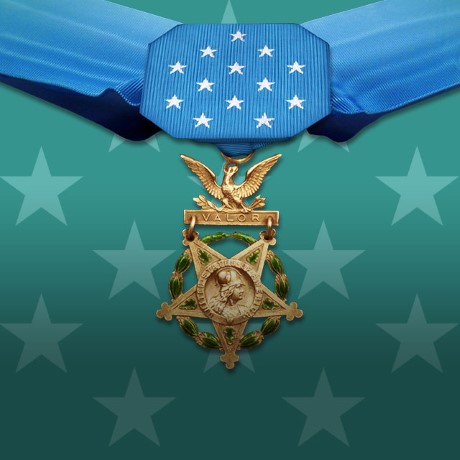
Corporal
Joseph H. De Castro
1864: Fought in Civil War. First Hispanic American to be awarded the Medal of Honor
READ MOREJoseph H. De Castro
 1864: Fought in Civil War. First Hispanic American to be awarded the Medal of Honor
1864: Fought in Civil War. First Hispanic American to be awarded the Medal of Honor
Cpl. Joseph De Castro was born in Boston, Massachusetts. Upon the outbreak of the Civil War, he was among the men who joined the all-volunteer 19th Massachusetts Infantry. He earned the Medal of Honor Citation by capturing the flag of the 19th Virginia Regiment. Awarded the Medal of Honor for his bravery during his regiment's attack and repulse of elements of Pickett's Charge on the Third Day of the Battle of Gettysburg, Pennsylvania, July 3, 1863. De Castro's medal was issued, December 1, 1864. He was one of seven 19th Massachusetts Infantry Soldiers to be awarded the Medal of Honor for bravery during the War.
Corporal Joseph H. De Castro
1864: Fought in Civil War. First Hispanic American to be awarded the Medal of Honor
Cpl. Joseph De Castro was born in Boston, Massachusetts. Upon the outbreak of the Civil War, he was among the men who joined the all-volunteer 19th Massachusetts Infantry. He earned the Medal of Honor Citation by capturing the flag of the 19th Virginia Regiment. Awarded the Medal of Honor for his bravery during his regiment's attack and repulse of elements of Pickett's Charge on the Third Day of the Battle of Gettysburg, Pennsylvania, July 3, 1863. De Castro's medal was issued, December 1, 1864. He was one of seven 19th Massachusetts Infantry Soldiers to be awarded the Medal of Honor for bravery during the War.
Medal of Honor Recipients
The Medal of Honor is the nation's highest medal for valor in combat that can be awarded to members of the armed forces.
The medal was first authorized in 1861 for Sailors and Marines, and the following year, for Soldiers as well. Since then, more than 3,400 Medals of Honor have been awarded to members of all DOD services and the Coast Guard, as well as to a few civilians who distinguished themselves with valor.
Medals of Honor are awarded sparingly and are bestowed only to the bravest of the brave; and that courage must be well documented sometimes resulting in their actions not being recognized for years after their heroic actions. The Hispanic American Army recipients are:
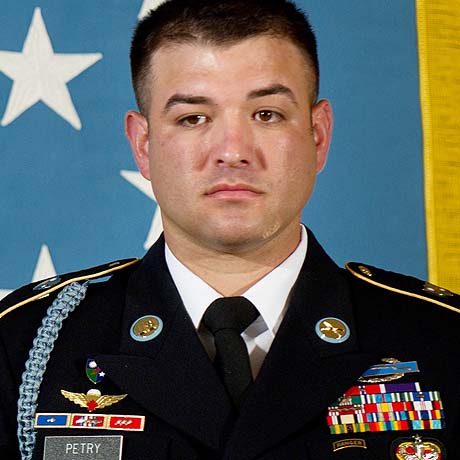
Staff Sergeant
Leroy Petry
2008: War in Afghanistan
READ MORELeroy Petry
 2008: War in Afghanistan
2008: War in Afghanistan
For conspicuous gallantry and intrepidity at the risk of his life above and beyond the call of duty: Then-Staff Sgt. Leroy A. Petry distinguished himself by acts of gallantry and intrepidity at the risk of his life above and beyond the call of duty in action with an armed enemy in the vicinity of Paktya Province, Afghanistan, on May 26, 2008. As a Weapons Squad Leader with D Company, 2nd Battalion, 75th Ranger Regiment, Petry moved to clear the courtyard of a house that potentially contained high-value combatants. While crossing the courtyard, Petry and another Ranger were engaged and wounded by automatic weapons fire from enemy fighters. Still under enemy fire, and wounded in both legs, Petry led the other Ranger to cover. He then reported the situation and engaged the enemy with a hand grenade, providing suppression as another Ranger moved to his position. The enemy quickly responded by maneuvering closer and throwing grenades. The first grenade explosion knocked his two fellow Rangers to the ground and wounded both with shrapnel. A second grenade then landed only a few feet away from them. Instantly realizing the danger, Petry, unhesitatingly and with complete disregard for his safety, deliberately and selflessly moved forward, picked up the grenade, and in an effort to clear the immediate threat, threw the grenade away from his fellow Rangers. As he was releasing the grenade it detonated, amputating his right hand at the wrist and further injuring him with multiple shrapnel wounds. Although picking up and throwing the live grenade grievously wounded Petry, his gallant act undeniably saved his fellow Rangers from being severely wounded or killed. Despite the severity of his wounds, Petry continued to maintain the presence of mind to place a tourniquet on his right wrist before communicating the situation by radio in order to coordinate support for himself and his fellow wounded Rangers. Petry continued to serve in the U.S. Army until 2014 when he retired at the rank of master sergeant. Petry's extraordinary heroism and devotion to duty are in keeping with the highest traditions of military service, and reflect great credit upon himself, 75th Ranger Regiment, and the United States Army.
Related Articles
Official page - Congressional Medal of Honor Society
U.S. Army — Medal of Honor Microsite: Leroy Petry
Staff Sergeant Leroy Petry
2008: War in Afghanistan
For conspicuous gallantry and intrepidity at the risk of his life above and beyond the call of duty: Then-Staff Sgt. Leroy A. Petry distinguished himself by acts of gallantry and intrepidity at the risk of his life above and beyond the call of duty in action with an armed enemy in the vicinity of Paktya Province, Afghanistan, on May 26, 2008. As a Weapons Squad Leader with D Company, 2nd Battalion, 75th Ranger Regiment, Petry moved to clear the courtyard of a house that potentially contained high-value combatants. While crossing the courtyard, Petry and another Ranger were engaged and wounded by automatic weapons fire from enemy fighters. Still under enemy fire, and wounded in both legs, Petry led the other Ranger to cover. He then reported the situation and engaged the enemy with a hand grenade, providing suppression as another Ranger moved to his position. The enemy quickly responded by maneuvering closer and throwing grenades. The first grenade explosion knocked his two fellow Rangers to the ground and wounded both with shrapnel. A second grenade then landed only a few feet away from them. Instantly realizing the danger, Petry, unhesitatingly and with complete disregard for his safety, deliberately and selflessly moved forward, picked up the grenade, and in an effort to clear the immediate threat, threw the grenade away from his fellow Rangers. As he was releasing the grenade it detonated, amputating his right hand at the wrist and further injuring him with multiple shrapnel wounds. Although picking up and throwing the live grenade grievously wounded Petry, his gallant act undeniably saved his fellow Rangers from being severely wounded or killed. Despite the severity of his wounds, Petry continued to maintain the presence of mind to place a tourniquet on his right wrist before communicating the situation by radio in order to coordinate support for himself and his fellow wounded Rangers. Petry continued to serve in the U.S. Army until 2014 when he retired at the rank of master sergeant. Petry's extraordinary heroism and devotion to duty are in keeping with the highest traditions of military service, and reflect great credit upon himself, 75th Ranger Regiment, and the United States Army.
Related Articles
Official page - Congressional Medal of Honor Society
U.S. Army — Medal of Honor Microsite: Leroy Petry
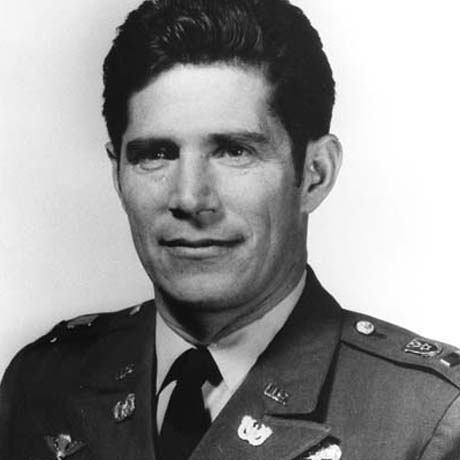
Sergeant First Class
Louis R. Rocco
1970: Vietnam War
READ MORELouis R. Rocco
 1970: Vietnam War
1970: Vietnam War
Then-Sgt. 1st Class Louis Rocco distinguished himself when he volunteered to accompany a medical evacuation team on an urgent mission to evacuate eight critically wounded Army of the Republic of Vietnam personnel. As the helicopter approached the landing zone, it became the target for intense enemy automatic-weapons fire. Disregarding his own safety, Rocco identified and placed accurate suppressive fire on the enemy positions as the aircraft descended toward the landing zone. Sustaining major damage from the enemy fire, the aircraft was forced to crash land, causing Rocco to sustain a fractured wrist and hip and severely bruised back. Ignoring his injuries, he extracted the survivors from the burning wreckage, sustaining burns to his own body. Despite intense enemy fire, Rocco carried each unconscious man across approximately 20 meters of exposed terrain to the Army of the Republic of Vietnam perimeter. On each trip, his severely burned hands and broken wrist caused excruciating pain, but the lives of the unconscious crash survivors were more important than his personal discomfort, and he continued his rescue efforts. Once inside the friendly position, Rocco helped administer first aid to his wounded comrades until his wounds and burns caused him to collapse and lose consciousness. His bravery under fire and intense devotion to duty were directly responsible for saving three of his fellow soldiers from certain death. His unparalleled bravery in the face of enemy fire, his complete disregard for his own pain and injuries, and his performance were far above and beyond the call of duty and were in keeping with the highest traditions of self-sacrifice and courage of the military service. Rocco went on to serve in the until 1978, retiring as a chief warrant officer 2.
Related Articles
Official page - Congressional Medal of Honor Society
Sergeant First Class Louis R. Rocco
1970: Vietnam War
Then-Sgt. 1st Class Louis Rocco distinguished himself when he volunteered to accompany a medical evacuation team on an urgent mission to evacuate eight critically wounded Army of the Republic of Vietnam personnel. As the helicopter approached the landing zone, it became the target for intense enemy automatic-weapons fire. Disregarding his own safety, Rocco identified and placed accurate suppressive fire on the enemy positions as the aircraft descended toward the landing zone. Sustaining major damage from the enemy fire, the aircraft was forced to crash land, causing Rocco to sustain a fractured wrist and hip and severely bruised back. Ignoring his injuries, he extracted the survivors from the burning wreckage, sustaining burns to his own body. Despite intense enemy fire, Rocco carried each unconscious man across approximately 20 meters of exposed terrain to the Army of the Republic of Vietnam perimeter. On each trip, his severely burned hands and broken wrist caused excruciating pain, but the lives of the unconscious crash survivors were more important than his personal discomfort, and he continued his rescue efforts. Once inside the friendly position, Rocco helped administer first aid to his wounded comrades until his wounds and burns caused him to collapse and lose consciousness. His bravery under fire and intense devotion to duty were directly responsible for saving three of his fellow soldiers from certain death. His unparalleled bravery in the face of enemy fire, his complete disregard for his own pain and injuries, and his performance were far above and beyond the call of duty and were in keeping with the highest traditions of self-sacrifice and courage of the military service. Rocco went on to serve in the until 1978, retiring as a chief warrant officer 2.
Related Articles
Official page - Congressional Medal of Honor Society
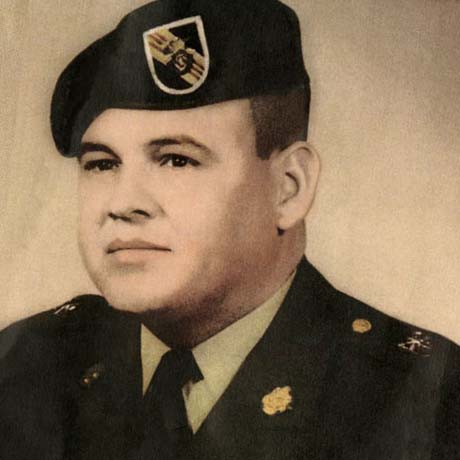
Sergeant First Class
Jose Rodela
1969: Vietnam War
READ MOREJose Rodela
 1969: Vietnam War
1969: Vietnam War
Sergeant First Class Jose Rodela distinguished himself by acts of gallantry and intrepidity above and beyond the call of duty while serving as the company commander, Detachment B-36, Company A, 5th Special Forces Group (Airborne), 1st Special Forces during combat operations against an armed enemy in Phuoc Long Province, Republic of Vietnam on September 1, 1969. That afternoon, Sgt. 1st Class Rodela's battalion came under an intense barrage of mortar, rocket, and machine gun fire. Ignoring the withering enemy fire, Sgt. 1st Class Rodela immediately began placing his men into defensive positions to prevent the enemy from overrunning the entire battalion. Repeatedly exposing himself to enemy fire, Sgt. 1st Class Rodela moved from position to position, providing suppressing fire and assisting wounded, and was himself wounded in the back and head by a B-40 rocket while recovering a wounded comrade. Alone, Sgt. 1st Class Rodela assaulted and knocked out the B-40 rocket position before successfully returning to the battalion's perimeter. Sgt. 1st Class Rodela's extraordinary heroism and selflessness above and beyond the call of duty are in keeping with the highest traditions of military service and reflect great credit upon himself, his unit and the United States Army.
Related Articles
Official page - Congressional Medal of Honor Society
U.S. Army — Medal of Honor Valor 24: Jose Rodela
Sergeant First Class Jose Rodela
1969: Vietnam War
Sergeant First Class Jose Rodela distinguished himself by acts of gallantry and intrepidity above and beyond the call of duty while serving as the company commander, Detachment B-36, Company A, 5th Special Forces Group (Airborne), 1st Special Forces during combat operations against an armed enemy in Phuoc Long Province, Republic of Vietnam on September 1, 1969. That afternoon, Sgt. 1st Class Rodela's battalion came under an intense barrage of mortar, rocket, and machine gun fire. Ignoring the withering enemy fire, Sgt. 1st Class Rodela immediately began placing his men into defensive positions to prevent the enemy from overrunning the entire battalion. Repeatedly exposing himself to enemy fire, Sgt. 1st Class Rodela moved from position to position, providing suppressing fire and assisting wounded, and was himself wounded in the back and head by a B-40 rocket while recovering a wounded comrade. Alone, Sgt. 1st Class Rodela assaulted and knocked out the B-40 rocket position before successfully returning to the battalion's perimeter. Sgt. 1st Class Rodela's extraordinary heroism and selflessness above and beyond the call of duty are in keeping with the highest traditions of military service and reflect great credit upon himself, his unit and the United States Army.
Related Articles
Official page - Congressional Medal of Honor Society
U.S. Army — Medal of Honor Valor 24: Jose Rodela
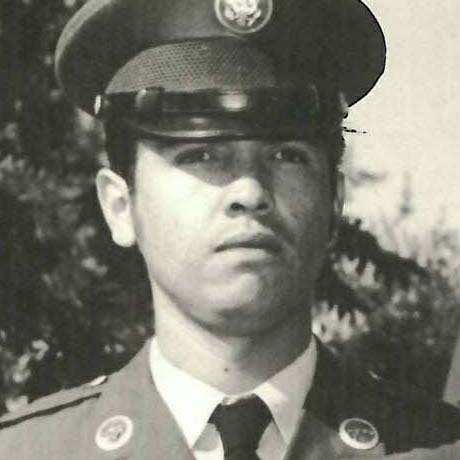
Specialist Four
Santiago J. Erevia
1969: Vietnam War
READ MORESantiago J. Erevia
 1969: Vietnam War
1969: Vietnam War
Then-Spc. 4 Santiago J. Erevia distinguished himself by acts of gallantry and intrepidity above and beyond the call of duty while serving as a radio telephone operator in Company C, 1st Battalion (Airmobile), 501st Infantry, 101st Airborne Division (Airmobile) during search and clear mission near Tam Ky, Republic of Vietnam on May 21, 1969. After breaching an insurgent perimeter, Spc. 4 Erevia was designated by his platoon leader to render first aid to several casualties, and the rest of the platoon moved forward. As he was doing so, he came under intense hostile fire from four bunkers to his left front. Although he could have taken cover with the rest of the element, he chose a retaliatory course of action. With heavy enemy fire directed at him, he moved in full view of the hostile gunners as he proceeded to crawl from one wounded man to another, gathering ammunition. Armed with two M-16 rifles and several hand grenades, he charged toward the enemy positions behind the suppressive fire of the two rifles. Under very intense fire, he continued to advance on the insurgents until he was near the first bunker. Disregarding the enemy fire, he pulled the pin from a hand grenade and advanced on the bunker, leveling suppressive fire until he could drop the grenade into the bunker, mortally wounding the insurgent and destroying the fortification. Without hesitation, he employed identical tactics as he proceeded to eliminate the next two enemy positions. With the destruction of the third bunker, Spc. 4 Erevia had exhausted his supply of hand grenades. Still under intense fire from the fourth position, he courageously charged forward behind the fire emitted by his M-16 rifles. Arriving at the very edge of the bunker, he silenced the occupant within the fortification at point blank range. Through his heroic actions the lives of the wounded were saved and the members of the Company Command Post were relieved from a very precarious situation. His exemplary performance in the face of overwhelming danger was an inspiration to his entire company and contributed immeasurably to the success of the mission. Spc. 4 Erevia's conspicuous gallantry, extraordinary heroism, and intrepidity at the risk of his own life, above and beyond the call of duty, were in keeping with the highest traditions of military service and reflect great credit upon himself, his unit, and the United States Army. In 1970, Erevia left active service with a two year reserve obligation. In 1972 he joined the Texas National Guard and went on to serve 17 years. Erevia also found employment with the U.S. Postal Service; after 32 years of public service there, he retired in 2002 at the rank of sergeant.Erevia passed away on March 22, 2016.
Related Articles
Official page - Congressional Medal of Honor Society
Specialist Four Santiago J. Erevia
1969: Vietnam War
Then-Spc. 4 Santiago J. Erevia distinguished himself by acts of gallantry and intrepidity above and beyond the call of duty while serving as a radio telephone operator in Company C, 1st Battalion (Airmobile), 501st Infantry, 101st Airborne Division (Airmobile) during search and clear mission near Tam Ky, Republic of Vietnam on May 21, 1969. After breaching an insurgent perimeter, Spc. 4 Erevia was designated by his platoon leader to render first aid to several casualties, and the rest of the platoon moved forward. As he was doing so, he came under intense hostile fire from four bunkers to his left front. Although he could have taken cover with the rest of the element, he chose a retaliatory course of action. With heavy enemy fire directed at him, he moved in full view of the hostile gunners as he proceeded to crawl from one wounded man to another, gathering ammunition. Armed with two M-16 rifles and several hand grenades, he charged toward the enemy positions behind the suppressive fire of the two rifles. Under very intense fire, he continued to advance on the insurgents until he was near the first bunker. Disregarding the enemy fire, he pulled the pin from a hand grenade and advanced on the bunker, leveling suppressive fire until he could drop the grenade into the bunker, mortally wounding the insurgent and destroying the fortification. Without hesitation, he employed identical tactics as he proceeded to eliminate the next two enemy positions. With the destruction of the third bunker, Spc. 4 Erevia had exhausted his supply of hand grenades. Still under intense fire from the fourth position, he courageously charged forward behind the fire emitted by his M-16 rifles. Arriving at the very edge of the bunker, he silenced the occupant within the fortification at point blank range. Through his heroic actions the lives of the wounded were saved and the members of the Company Command Post were relieved from a very precarious situation. His exemplary performance in the face of overwhelming danger was an inspiration to his entire company and contributed immeasurably to the success of the mission. Spc. 4 Erevia's conspicuous gallantry, extraordinary heroism, and intrepidity at the risk of his own life, above and beyond the call of duty, were in keeping with the highest traditions of military service and reflect great credit upon himself, his unit, and the United States Army. In 1970, Erevia left active service with a two year reserve obligation. In 1972 he joined the Texas National Guard and went on to serve 17 years. Erevia also found employment with the U.S. Postal Service; after 32 years of public service there, he retired in 2002 at the rank of sergeant.Erevia passed away on March 22, 2016.
Related Articles
Official page - Congressional Medal of Honor Society
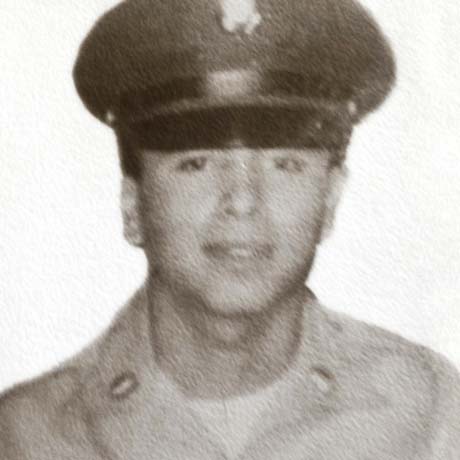
Specialist Four
Jesus S. Duran
1969: Korean War
READ MOREJesus S. Duran
 1969: Korean War
1969: Korean War
Specialist Four Jesus S. Duran distinguished himself by acts of gallantry and intrepidity above and beyond the call of duty while serving as an acting M-60 machine gunner in Company E, 2d Battalion, 5th Cavalry, 1st Cavalry Division (Airmobile) during combat operations against an armed enemy in the Republic of Vietnam on April 10, 1969. That afternoon, the reconnaissance platoon was moving into an elaborate enemy bunker complex when the lead elements began taking concentrated ambush fire from every side. The command post was in imminent danger of being overrun. With an M-60 machinegun blazing from his hip, Specialist Four Duran rushed forward and assumed a defensive position near the command post. As hostile forces stormed forward, Specialist Four Duran stood tall in a cloud of dust raised by the impacting rounds and bursting grenades directed towards him and thwarted the enemy with devastating streams of machinegun fire. Learning that two seriously wounded troopers lay helplessly pinned down under harassing fire, Specialist Four Duran assaulted the suppressive enemy positions, firing deadly bursts on the run. Mounting a log, he fired directly into the enemy's foxholes, eliminating four and cutting down several others as they fled. Specialist Four Duran then continued to pour effective fire on the disorganized and fleeing enemy. Specialist Four Duran's extraordinary heroism and selflessness above and beyond the call of duty are in keeping with the highest traditions of military service and reflect great credit upon himself, his unit and the United States Army.
Related Articles
Official page - Congressional Medal of Honor Society
Specialist Four Jesus S. Duran
1969: Korean War
Specialist Four Jesus S. Duran distinguished himself by acts of gallantry and intrepidity above and beyond the call of duty while serving as an acting M-60 machine gunner in Company E, 2d Battalion, 5th Cavalry, 1st Cavalry Division (Airmobile) during combat operations against an armed enemy in the Republic of Vietnam on April 10, 1969. That afternoon, the reconnaissance platoon was moving into an elaborate enemy bunker complex when the lead elements began taking concentrated ambush fire from every side. The command post was in imminent danger of being overrun. With an M-60 machinegun blazing from his hip, Specialist Four Duran rushed forward and assumed a defensive position near the command post. As hostile forces stormed forward, Specialist Four Duran stood tall in a cloud of dust raised by the impacting rounds and bursting grenades directed towards him and thwarted the enemy with devastating streams of machinegun fire. Learning that two seriously wounded troopers lay helplessly pinned down under harassing fire, Specialist Four Duran assaulted the suppressive enemy positions, firing deadly bursts on the run. Mounting a log, he fired directly into the enemy's foxholes, eliminating four and cutting down several others as they fled. Specialist Four Duran then continued to pour effective fire on the disorganized and fleeing enemy. Specialist Four Duran's extraordinary heroism and selflessness above and beyond the call of duty are in keeping with the highest traditions of military service and reflect great credit upon himself, his unit and the United States Army.
Related Articles
Official page - Congressional Medal of Honor Society
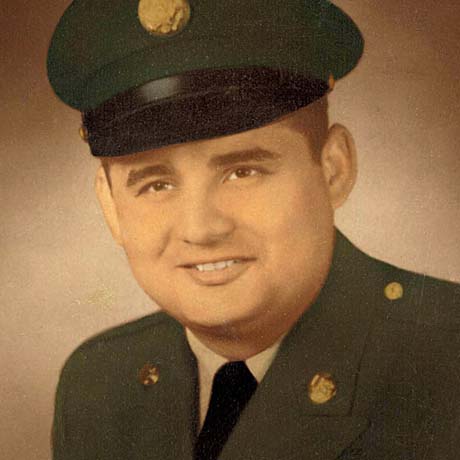
Staff Sergeant
Felix M. Conde-Falcon
1969: Vietnam War
READ MOREFelix M. Conde-Falcon
 1969: Vietnam War
1969: Vietnam War
Staff Sgt. Felix M. Conde-Falcon distinguished himself by acts of gallantry and intrepidity above and beyond the call of duty while serving as an acting Platoon Leader in Company D, 1st Battalion, 505th Infantry Regiment, 3d Brigade, 82d Airborne Division during combat operations against an armed enemy in Ap Tan Hoa, Republic of Vietnam on April 4, 1969. While entering a heavily wooded section on the route of advance, Staff. Sgt. Conde-Falcon and his company encountered an extensive enemy bunker complex, later identified as a battalion command post. Following tactical artillery and air strikes on the heavily-secured enemy position, Staff. Sgt. Conde-Falcon's platoon was selected to assault and clear the bunker fortifications. Moving out ahead of his platoon, Staff. Sgt. Conde-Falcon charged the first bunker, heaving grenades as he went. As the hostile fire increased, he crawled to the blind side of an entrenchment position, jumped to the roof, and tossed a grenade into the bunker aperture. Without hesitating, he proceeded to two additional bunkers, both of which he destroyed in the same manner as the first. Rejoining his platoon, Staff. Sgt. Conde-Falcon advanced about one hundred meters through the trees before coming under intense hostile fire. Selecting three men to accompany him, he maneuvered toward the enemy's flank position. Carrying a machinegun, he single-handedly assaulted the nearest fortification, killing the enemy inside before running out of ammunition. After returning to the three men with his empty weapon and taking up an M-16 rifle, he concentrated on the next bunker. Within ten meters of his goal, Staff. Sgt. Conde-Falcon was shot by an unseen assailant and soon died of his wounds. Staff. Sgt. Conde-Falcon's extraordinary heroism and selflessness at the cost of his own life, above and beyond the call of duty, are in keeping with the highest traditions of military service and reflect great credit upon himself, his unit and the United States Army.
Related Articles
Official page - Congressional Medal of Honor Society
Staff Sergeant Felix M. Conde-Falcon
1969: Vietnam War
Staff Sgt. Felix M. Conde-Falcon distinguished himself by acts of gallantry and intrepidity above and beyond the call of duty while serving as an acting Platoon Leader in Company D, 1st Battalion, 505th Infantry Regiment, 3d Brigade, 82d Airborne Division during combat operations against an armed enemy in Ap Tan Hoa, Republic of Vietnam on April 4, 1969. While entering a heavily wooded section on the route of advance, Staff. Sgt. Conde-Falcon and his company encountered an extensive enemy bunker complex, later identified as a battalion command post. Following tactical artillery and air strikes on the heavily-secured enemy position, Staff. Sgt. Conde-Falcon's platoon was selected to assault and clear the bunker fortifications. Moving out ahead of his platoon, Staff. Sgt. Conde-Falcon charged the first bunker, heaving grenades as he went. As the hostile fire increased, he crawled to the blind side of an entrenchment position, jumped to the roof, and tossed a grenade into the bunker aperture. Without hesitating, he proceeded to two additional bunkers, both of which he destroyed in the same manner as the first. Rejoining his platoon, Staff. Sgt. Conde-Falcon advanced about one hundred meters through the trees before coming under intense hostile fire. Selecting three men to accompany him, he maneuvered toward the enemy's flank position. Carrying a machinegun, he single-handedly assaulted the nearest fortification, killing the enemy inside before running out of ammunition. After returning to the three men with his empty weapon and taking up an M-16 rifle, he concentrated on the next bunker. Within ten meters of his goal, Staff. Sgt. Conde-Falcon was shot by an unseen assailant and soon died of his wounds. Staff. Sgt. Conde-Falcon's extraordinary heroism and selflessness at the cost of his own life, above and beyond the call of duty, are in keeping with the highest traditions of military service and reflect great credit upon himself, his unit and the United States Army.
Related Articles
Official page - Congressional Medal of Honor Society
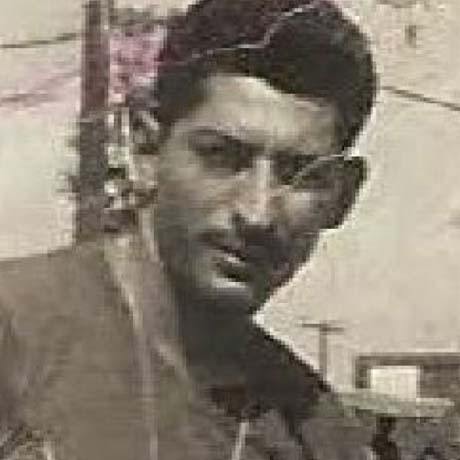
Specialist Four
Leonard L. Alvarado
1969: Vietnam War
READ MORELeonard L. Alvarado
 1969: Vietnam War
1969: Vietnam War
Spc. 4 Leonard L. Alvarado distinguished himself by acts of gallantry and intrepidity above and beyond the call of duty while serving as a Rifleman with Company D, 2d Battalion, 12th Cavalry, 1st Cavalry Division (Airmobile) during combat operations against an armed enemy in Phuoc Long Province, Republic of Vietnam on August 12, 1969. On that day, as Spc. 4 Alvarado and a small reaction force moved through dense jungle en route to a beleaguered friendly platoon, Spc. 4 Alvarado detected enemy movement and opened fire. Despite his quick reaction, Spc. 4 Alvarado and his comrades were soon pinned down by the hostile force that blocked the path to the trapped platoon. Spc. 4 Alvarado quickly moved forward through the hostile machinegun fire in order to engage the enemy troops. Suddenly, an enemy grenade exploded nearby, wounding and momentarily stunning him. Retaliating immediately, he killed the grenadier just as another enemy barrage wounded him again. Spc. 4 Alvarado crawled forward through the fusillade to pull several comrades back within the hastily-formed perimeter. Realizing his element needed to break away from the hostile force, Spc. 4 Alvarado began maneuvering forward alone. Though repeatedly thrown to the ground by exploding satchel charges, he continued advancing and firing, silencing several emplacements, including one enemy machinegun position. From his dangerous forward position, he persistently laid suppressive fire on the hostile forces, and after the enemy troops had broken contact, his comrades discovered that he had succumbed to his wounds. Spc. 4 Alvarado's extraordinary heroism and selflessness at the cost of his own life, above and beyond the call of duty, are in keeping with the highest traditions of military service and reflect great credit upon himself, his unit and the United States Army.
Related Articles
Official page - Congressional Medal of Honor Society
Specialist Four Leonard L. Alvarado
1969: Vietnam War
Spc. 4 Leonard L. Alvarado distinguished himself by acts of gallantry and intrepidity above and beyond the call of duty while serving as a Rifleman with Company D, 2d Battalion, 12th Cavalry, 1st Cavalry Division (Airmobile) during combat operations against an armed enemy in Phuoc Long Province, Republic of Vietnam on August 12, 1969. On that day, as Spc. 4 Alvarado and a small reaction force moved through dense jungle en route to a beleaguered friendly platoon, Spc. 4 Alvarado detected enemy movement and opened fire. Despite his quick reaction, Spc. 4 Alvarado and his comrades were soon pinned down by the hostile force that blocked the path to the trapped platoon. Spc. 4 Alvarado quickly moved forward through the hostile machinegun fire in order to engage the enemy troops. Suddenly, an enemy grenade exploded nearby, wounding and momentarily stunning him. Retaliating immediately, he killed the grenadier just as another enemy barrage wounded him again. Spc. 4 Alvarado crawled forward through the fusillade to pull several comrades back within the hastily-formed perimeter. Realizing his element needed to break away from the hostile force, Spc. 4 Alvarado began maneuvering forward alone. Though repeatedly thrown to the ground by exploding satchel charges, he continued advancing and firing, silencing several emplacements, including one enemy machinegun position. From his dangerous forward position, he persistently laid suppressive fire on the hostile forces, and after the enemy troops had broken contact, his comrades discovered that he had succumbed to his wounds. Spc. 4 Alvarado's extraordinary heroism and selflessness at the cost of his own life, above and beyond the call of duty, are in keeping with the highest traditions of military service and reflect great credit upon himself, his unit and the United States Army.
Related Articles
Official page - Congressional Medal of Honor Society
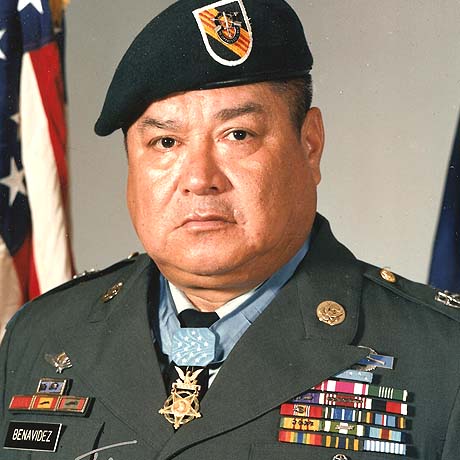
Staff Sergeant Roy P. Benavidez
1968: Vietnam War
Staff. Sgt Roy P. Benavidez, United States Army, who distinguished himself by a series of daring and extremely valorous actions on 2 May 1968 while assigned to Detachment B-56, 5th Special Forces Group (Airborne), 1st Special Forces, Republic of Vietnam. On the morning of 2 May 1968, a 12-man Special Forces Reconnaissance Team was inserted by helicopters in a dense jungle area west of Loc Ninh, Vietnam, to gather intelligence information about confirmed large-scale enemy activity. This area was controlled and routinely patrolled by the North Vietnamese Army. After a short period of time on the ground, the team met heavy enemy resistance, and requested emergency extraction. Three helicopters attempted extraction, but were unable to land due to intense enemy small-arms and anti-aircraft fire. Sgt. Benavidez was at the Forward Operating Base in Loc Ninh monitoring the operation by radio when these helicopters returned to off-load wounded crewmembers and to assess aircraft damage. Sgt. Benevidez voluntarily boarded a returning aircraft to assist in another extraction attempt. Realizing that all the team members were either dead or wounded and unable to move to the pickup zone, he directed the aircraft to a nearby clearing while he jumped from the hovering helicopter, and ran approximately 75 meters under withering small-arms fire to the crippled team. Prior to reaching the team's position he was wounded in his right leg, face, and head. Despite these painful injuries, he took charge, repositioning the team members and directing their fire to facilitate the landing of the extraction aircraft and the loading of the wounded and dead team members. He then threw smoke canisters to direct the aircraft to the team's position. Despite his severe wounds and under intense enemy fire, he carried and dragged half of the wounded team members to the awaiting aircraft. He then provided protective fire by running alongside the aircraft as it moved to pick up the remaining team members. As the enemy's fire intensified, he hurried to recover the body and classified documents on the dead team leader. When he reached the leader's body, Sgt. Benevidez was severely wounded by small-arms fire in the abdomen and grenade fragments in his back. At nearly the same moment, the aircraft pilot was mortally wounded, and his helicopter crashed. Although in extremely critical condition due to his multiple wounds, Sgt. Benevidez secured the classified documents and made his way back to the wreckage, where he aided the wounded out of the overturned aircraft, and gathered the stunned survivors into a defensive perimeter. Under increasing enemy automatic-weapons and grenade fire, he moved around the perimeter distributing water and ammunition to his weary men, reinstilling in them a will to live and fight. Facing a buildup of enemy opposition with a beleaguered team, Sgt. Benevidez mustered his strength, began calling in tactical air strikes and directed the fire from supporting gunships to suppress the enemy's fire and so permitted another extraction attempt. He was wounded again in his thigh by small-arms fire while administering first aid to a wounded team member just before another extraction helicopter was able to land. His indomitable spirit kept him going as he began to ferry his comrades to the craft. On his second trip with the wounded, he was clubbed from additional wounds to his head and arms before killing his adversary. He then continued under devastating fire to carry the wounded to the helicopter. Upon reaching the aircraft, he spotted and killed two enemy soldiers who were rushing the craft from an angle that prevented the aircraft door-gunner from firing upon them. With little strength remaining, he made one last trip to the perimeter to ensure that all classified material had been collected or destroyed and to bring in the remaining wounded. Only then, in extremely serious condition from numerous wounds and loss of blood, did he allow himself to be pulled into the extraction aircraft. Six hours after he first jumped aboard the helicopter, Benavidez felt himself being placed into a body bag, presumed dead. Mustering the last of his strength, unable to speak, move, or open his eyes, he spat in the doctor’s face to convey that he was still alive. After over a year in various hospitals, Benavidez recovered and was awarded the Distinguished Service Cross; at the time, the Army believed there was no eyewitness to the account, a requirement at the time to award the Medal of Honor. On Feb. 24, 1981, after finding a living eyewitness, President Ronald Reagan upgraded his Distinguished Service Cross to a Medal of Honor. After serving at Fort Riley, Kansas and Fort Sam Houston, Texas, and having reached the rank of master sergeant, Benavidez retired in 1976. Sgt. Benevidez' gallant choice to join voluntarily his comrades who were in critical straits, to expose himself constantly to withering enemy fire, and his refusal to be stopped despite numerous severe wounds, saved the lives of at least eight men. His fearless personal leadership, tenacious devotion to duty, and extremely valorous actions in the face of overwhelming odds were in keeping with the highest traditions of the military service and reflect the utmost credit on him and the United States Army.
Related Articles
Official page - Congressional Medal of Honor Society
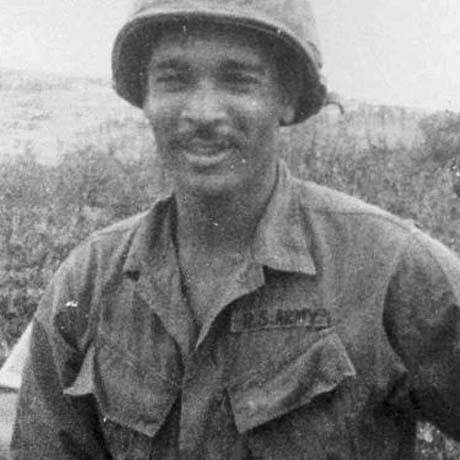
Specialist Four
Hector Santiago-Colon
1968: Vietnam War
READ MOREHector Santiago-Colon
 1968: Vietnam War
1968: Vietnam War
For conspicuous gallantry and intrepidity in action at the risk of his life above and beyond the call of duty. Spc. 4 Santiago-Colon distinguished himself at the cost of his life while serving as a gunner in the mortar platoon of Company B. While serving as a perimeter sentry, Spc. 4 Santiago-Colon heard distinct movement in the heavily wooded area to his front and flanks. Immediately he alerted his fellow sentries in the area to move to their foxholes and remain alert for any enemy probing forces. From the wooded area around his position heavy enemy automatic-weapons and small-arms fire suddenly broke out, but extreme darkness rendered difficult the precise location and identification of the hostile force. Only the muzzle flashes from the enemy weapons indicated their positions. Spc. 4 Santiago-Colon and the other members of his platoon immediately began to repel the attackers, utilizing hand grenades, antipersonnel mines and small-arms fire. Due to the heavy volume of enemy fire and exploding grenades around them, a North Vietnamese soldier was able to crawl, undetected, to their position. Suddenly, the enemy soldier lobbed a hand grenade into Spc. 4 Santiago-Colon's foxhole. Realizing that there was no time to throw the grenade out of his position, Spc. 4 Santiago-Colon retrieved the grenade, tucked it into his stomach and, turning away from his comrades, absorbed the full impact of the blast. His heroic self-sacrifice saved the lives of those who occupied the foxhole with him, and provided them with the inspiration to continue fighting until they had forced the enemy to retreat from the perimeter. By his gallantry at the cost of his life and in the highest traditions of the military service, Spc. 4 Santiago-Colon has reflected great credit upon himself, his unit, and the U.S. Army.
Related Articles
Official page - Congressional Medal of Honor Society
Specialist Four Hector Santiago-Colon
1968: Vietnam War
For conspicuous gallantry and intrepidity in action at the risk of his life above and beyond the call of duty. Spc. 4 Santiago-Colon distinguished himself at the cost of his life while serving as a gunner in the mortar platoon of Company B. While serving as a perimeter sentry, Spc. 4 Santiago-Colon heard distinct movement in the heavily wooded area to his front and flanks. Immediately he alerted his fellow sentries in the area to move to their foxholes and remain alert for any enemy probing forces. From the wooded area around his position heavy enemy automatic-weapons and small-arms fire suddenly broke out, but extreme darkness rendered difficult the precise location and identification of the hostile force. Only the muzzle flashes from the enemy weapons indicated their positions. Spc. 4 Santiago-Colon and the other members of his platoon immediately began to repel the attackers, utilizing hand grenades, antipersonnel mines and small-arms fire. Due to the heavy volume of enemy fire and exploding grenades around them, a North Vietnamese soldier was able to crawl, undetected, to their position. Suddenly, the enemy soldier lobbed a hand grenade into Spc. 4 Santiago-Colon's foxhole. Realizing that there was no time to throw the grenade out of his position, Spc. 4 Santiago-Colon retrieved the grenade, tucked it into his stomach and, turning away from his comrades, absorbed the full impact of the blast. His heroic self-sacrifice saved the lives of those who occupied the foxhole with him, and provided them with the inspiration to continue fighting until they had forced the enemy to retreat from the perimeter. By his gallantry at the cost of his life and in the highest traditions of the military service, Spc. 4 Santiago-Colon has reflected great credit upon himself, his unit, and the U.S. Army.
Related Articles
Official page - Congressional Medal of Honor Society
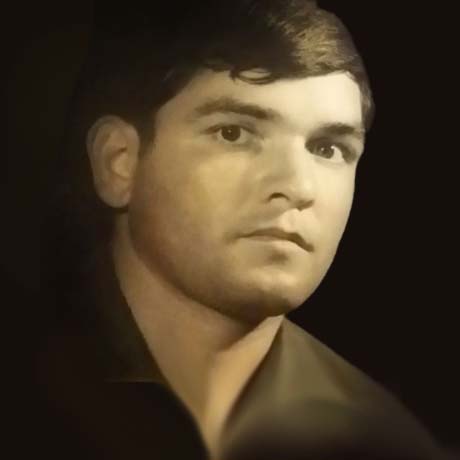
Sergeant
Candelario Garcia
1968: Vietnam War
READ MORECandelario Garcia
 1968: Vietnam War
1968: Vietnam War
Sgt. Candelario Garcia distinguished himself by acts of gallantry and intrepidity above and beyond the call of duty while serving as an acting Team Leader for Company B, 1st Battalion, 2d Infantry, 1st Brigade,1st Infantry Division during combat operations against an armed enemy in Lai Khe, Republic of Vietnam on December 8, 1968. On that day, while conducting reconnaissance, Sgt. Garcia and his platoon discovered communication wire and other signs of an enemy base camp leading into a densely vegetated area. As the men advanced, they came under intense fire. Several men were hit and trapped in the open. Ignoring a hail of hostile bullets, Sgt. Garcia crawled to within ten meters of a machinegun bunker, leaped to his feet and ran directly at the fortification, firing his rifle as he charged. Sgt. Garcia jammed two hand grenades into the gun port and then placed the muzzle of his weapon inside, killing all four occupants. Continuing to expose himself to intense enemy fire, Sgt. Garcia raced fifteen meters to another bunker and killed its three defenders with hand grenades and rifle fire. After again braving the enemies' barrage in order to rescue two casualties, he joined his company in an assault which overran the remaining enemy positions. Sgt. Garcia's extraordinary heroism and selflessness above and beyond the call of duty are in keeping with the highest traditions of military service and reflect great credit upon himself, his unit and the United States Army.
Related Articles
Official page - Congressional Medal of Honor Society
Sergeant Candelario Garcia
1968: Vietnam War
Sgt. Candelario Garcia distinguished himself by acts of gallantry and intrepidity above and beyond the call of duty while serving as an acting Team Leader for Company B, 1st Battalion, 2d Infantry, 1st Brigade,1st Infantry Division during combat operations against an armed enemy in Lai Khe, Republic of Vietnam on December 8, 1968. On that day, while conducting reconnaissance, Sgt. Garcia and his platoon discovered communication wire and other signs of an enemy base camp leading into a densely vegetated area. As the men advanced, they came under intense fire. Several men were hit and trapped in the open. Ignoring a hail of hostile bullets, Sgt. Garcia crawled to within ten meters of a machinegun bunker, leaped to his feet and ran directly at the fortification, firing his rifle as he charged. Sgt. Garcia jammed two hand grenades into the gun port and then placed the muzzle of his weapon inside, killing all four occupants. Continuing to expose himself to intense enemy fire, Sgt. Garcia raced fifteen meters to another bunker and killed its three defenders with hand grenades and rifle fire. After again braving the enemies' barrage in order to rescue two casualties, he joined his company in an assault which overran the remaining enemy positions. Sgt. Garcia's extraordinary heroism and selflessness above and beyond the call of duty are in keeping with the highest traditions of military service and reflect great credit upon himself, his unit and the United States Army.
Related Articles
Official page - Congressional Medal of Honor Society
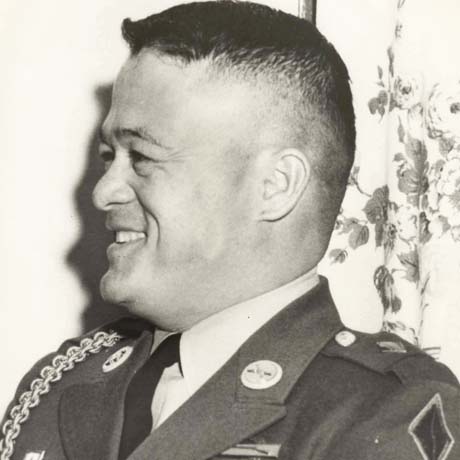
First Sergeant
Maximo Yabes
1967: Vietnam War
READ MOREMaximo Yabes
 1967: Vietnam War
1967: Vietnam War
For conspicuous gallantry and intrepidity at the risk of his life above and beyond the call of duty. 1st Sgt. Yabes distinguished himself with Company A, which was providing security for a land-clearing operation. Early in the morning the company suddenly came under intense automatic-weapons and mortar fire followed by a battalion-sized assault from three sides. Penetrating the defensive perimeter, the enemy advanced on the company command post bunker. The command post received increasingly heavy fire and was in danger of being overwhelmed. When several enemy grenades landed within the command post, 1st Sgt. Yabes shouted a warning and used his body as a shield to protect others in the bunker. Although painfully wounded by numerious grenade fragments, and despite the vicious enemy fire on the bunker, he remained there to provide covering fire and enable the others in the command group to relocate. When the command group had reached a new position, 1st Sgt. Yabes moved through a withering hail of enemy fire to another bunker 50 meters away. There he secured a grenade launcher from a fallen comrade and fired point-blank into the attacking Viet Cong, stopping further penetration of the perimeter. Noting two wounded men helpless in the fire-swept area, he moved them to a safer position where they could be given medical treatment. He resumed his accurate and effective fire, killing several enemy soldiers and forcing others to withdraw from the vicinity of the command post. As the battle continued, he observed an enemy machine gun within the perimeter which threatened the whole position. On his own, he dashed across the exposed area, assaulted the machine gun, killed the crew, destroyed the weapon, and fell mortally wounded. 1st Sgt. Yabes' valiant and selfless actions saved the lives of many of his fellow soldiers and inspired his comrades to effectively repel the enemy assault. His indomitable fighting spirit, extraordinary courage, and intrepidity at the cost of his life are in the highest military traditions and reflect great credit upon himself and the Armed Forces of his country.
Related Articles
Official page - Congressional Medal of Honor Society
First Sergeant Maximo Yabes
1967: Vietnam War
For conspicuous gallantry and intrepidity at the risk of his life above and beyond the call of duty. 1st Sgt. Yabes distinguished himself with Company A, which was providing security for a land-clearing operation. Early in the morning the company suddenly came under intense automatic-weapons and mortar fire followed by a battalion-sized assault from three sides. Penetrating the defensive perimeter, the enemy advanced on the company command post bunker. The command post received increasingly heavy fire and was in danger of being overwhelmed. When several enemy grenades landed within the command post, 1st Sgt. Yabes shouted a warning and used his body as a shield to protect others in the bunker. Although painfully wounded by numerious grenade fragments, and despite the vicious enemy fire on the bunker, he remained there to provide covering fire and enable the others in the command group to relocate. When the command group had reached a new position, 1st Sgt. Yabes moved through a withering hail of enemy fire to another bunker 50 meters away. There he secured a grenade launcher from a fallen comrade and fired point-blank into the attacking Viet Cong, stopping further penetration of the perimeter. Noting two wounded men helpless in the fire-swept area, he moved them to a safer position where they could be given medical treatment. He resumed his accurate and effective fire, killing several enemy soldiers and forcing others to withdraw from the vicinity of the command post. As the battle continued, he observed an enemy machine gun within the perimeter which threatened the whole position. On his own, he dashed across the exposed area, assaulted the machine gun, killed the crew, destroyed the weapon, and fell mortally wounded. 1st Sgt. Yabes' valiant and selfless actions saved the lives of many of his fellow soldiers and inspired his comrades to effectively repel the enemy assault. His indomitable fighting spirit, extraordinary courage, and intrepidity at the cost of his life are in the highest military traditions and reflect great credit upon himself and the Armed Forces of his country.
Related Articles
Official page - Congressional Medal of Honor Society
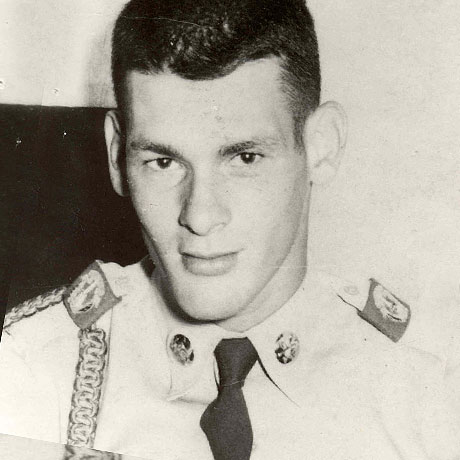
Staff Sergeant
Elmelindo Rodrigues Smith
1967: Vietnam War
READ MOREElmelindo Rodrigues Smith
 1967: Vietnam War
1967: Vietnam War
Then-Staff Sgt. Elmelindo Rodrigues Smith was awardedt the Medal of Honor for conspicuous gallantry and intrepidity at the risk of his life above and beyond the call of duty. During a reconnaissance patrol, his platoon was suddenly engaged by intense machine-gun fire hemming in the platoon on three sides. A defensive perimeter was hastily established, but the enemy added mortar and rocket fire to the deadly fusillade and assaulted the position from several directions. With complete disregard for his safety, Staff Sgt. Smith moved through the deadly fire along the defensive line, positioning soldiers, distributing ammunition, and encouraging his men to repel the enemy attack. Struck to the ground by enemy fire which caused a severe shoulder wound, he regained his feet, killed the enemy soldier, and continued to move about the perimeter. He was again wounded in the shoulder and stomach but continued moving on his knees to assist in the defense. Noting the enemy massing at a weakened point on the perimeter, he crawled into the open and poured deadly fire into the enemy ranks. As he crawled on, he was struck by a rocket. Moments later, he regained consciousness, and drawing on his fast dwindling strength, continued to crawl from man to man. When he could move no farther, he chose to remain in the open where he could alert the perimeter to the approaching enemy. Staff Sgt. Smith perished, never relenting in his determined effort against the enemy. The valorous acts and heroic leadership of this outstanding soldier inspired those remaining members of his platoon to beat back the enemy assaults. Staff Sgt. Smith's gallant actions were in keeping with the highest traditions of the U.S. Army and they reflect great credit upon him and the Armed Forces of his country.
Related Articles
Official page - Congressional Medal of Honor Society
Staff Sergeant Elmelindo Rodrigues Smith
1967: Vietnam War
Then-Staff Sgt. Elmelindo Rodrigues Smith was awardedt the Medal of Honor for conspicuous gallantry and intrepidity at the risk of his life above and beyond the call of duty. During a reconnaissance patrol, his platoon was suddenly engaged by intense machine-gun fire hemming in the platoon on three sides. A defensive perimeter was hastily established, but the enemy added mortar and rocket fire to the deadly fusillade and assaulted the position from several directions. With complete disregard for his safety, Staff Sgt. Smith moved through the deadly fire along the defensive line, positioning soldiers, distributing ammunition, and encouraging his men to repel the enemy attack. Struck to the ground by enemy fire which caused a severe shoulder wound, he regained his feet, killed the enemy soldier, and continued to move about the perimeter. He was again wounded in the shoulder and stomach but continued moving on his knees to assist in the defense. Noting the enemy massing at a weakened point on the perimeter, he crawled into the open and poured deadly fire into the enemy ranks. As he crawled on, he was struck by a rocket. Moments later, he regained consciousness, and drawing on his fast dwindling strength, continued to crawl from man to man. When he could move no farther, he chose to remain in the open where he could alert the perimeter to the approaching enemy. Staff Sgt. Smith perished, never relenting in his determined effort against the enemy. The valorous acts and heroic leadership of this outstanding soldier inspired those remaining members of his platoon to beat back the enemy assaults. Staff Sgt. Smith's gallant actions were in keeping with the highest traditions of the U.S. Army and they reflect great credit upon him and the Armed Forces of his country.
Related Articles
Official page - Congressional Medal of Honor Society
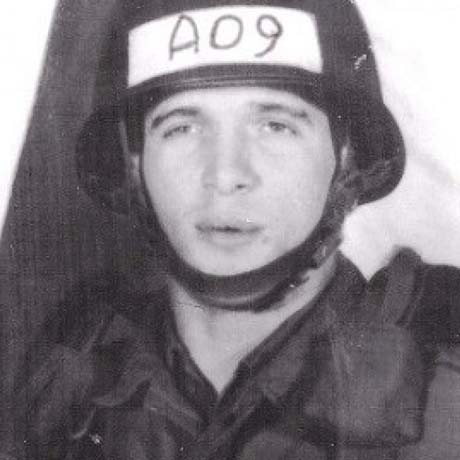
Private First Class
Carlos Lozada
1967: Vietnam War
READ MORECarlos Lozada
 1967: Vietnam War
1967: Vietnam War
For conspicuous gallantry and intrepidity in action at the risk of his life above and beyond the call of duty. Pfc. Lozada, U.S. Army, distinguished himself at the risk of his life above and beyond the call of duty in the battle of Dak To. While serving as a machine gunner with 1st Platoon, Company A, Pfc. Lozada was part of a four-man early warning outpost, located 35 meters from his company's lines. At 1400 hours a North Vietnamese Army company rapidly approached the outpost along a well-defended trail. Pfc. Lozada alerted his comrades and commenced firing at the enemy who were within 10 meters of the outpost. His heavy and accurate machine-gun fire killed at least 20 North Vietnamese soldiers and completely disrupted their initial attack. Pfc. Lozada remained in an exposed position and continued to pour deadly fire upon the enemy despite the urgent pleas of his comrades to withdraw. The enemy continued their assault, attempting to envelop the outpost. At the same time enemy forces launched a heavy attack on the forward west flank of Company A with the intent to cut them off from their battalion. Company A was given the order to withdraw. Pfc. Lozada apparently realized that if he abandoned his position there would be nothing to hold back the surging North Vietnamese soldiers and that the entire company withdrawal would be jeopardized. He called for his comrades to move back and that he would stay and provide cover for them. He made this decision realizing that the enemy was converging on three sides of his position and only meters away, and a delay in withdrawal meant almost certain death. Pfc. Lozada continued to deliver a heavy, accurate volume of suppressive fire against the enemy until he was mortally wounded and had to be carried during the withdrawal. His heroic deed served as an example and an inspiration to his comrades throughout the ensuing four-day battle. Pfc. Lozada's actions are in the highest traditions of the U.S. Army and reflect great credit upon himself, his unit, and the U.S. Army.
Related Articles
Official page - Congressional Medal of Honor Society
Private First Class Carlos Lozada
1967: Vietnam War
For conspicuous gallantry and intrepidity in action at the risk of his life above and beyond the call of duty. Pfc. Lozada, U.S. Army, distinguished himself at the risk of his life above and beyond the call of duty in the battle of Dak To. While serving as a machine gunner with 1st Platoon, Company A, Pfc. Lozada was part of a four-man early warning outpost, located 35 meters from his company's lines. At 1400 hours a North Vietnamese Army company rapidly approached the outpost along a well-defended trail. Pfc. Lozada alerted his comrades and commenced firing at the enemy who were within 10 meters of the outpost. His heavy and accurate machine-gun fire killed at least 20 North Vietnamese soldiers and completely disrupted their initial attack. Pfc. Lozada remained in an exposed position and continued to pour deadly fire upon the enemy despite the urgent pleas of his comrades to withdraw. The enemy continued their assault, attempting to envelop the outpost. At the same time enemy forces launched a heavy attack on the forward west flank of Company A with the intent to cut them off from their battalion. Company A was given the order to withdraw. Pfc. Lozada apparently realized that if he abandoned his position there would be nothing to hold back the surging North Vietnamese soldiers and that the entire company withdrawal would be jeopardized. He called for his comrades to move back and that he would stay and provide cover for them. He made this decision realizing that the enemy was converging on three sides of his position and only meters away, and a delay in withdrawal meant almost certain death. Pfc. Lozada continued to deliver a heavy, accurate volume of suppressive fire against the enemy until he was mortally wounded and had to be carried during the withdrawal. His heroic deed served as an example and an inspiration to his comrades throughout the ensuing four-day battle. Pfc. Lozada's actions are in the highest traditions of the U.S. Army and reflect great credit upon himself, his unit, and the U.S. Army.
Related Articles
Official page - Congressional Medal of Honor Society
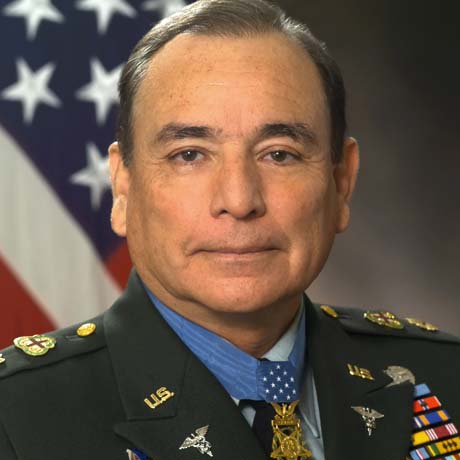
Specialist Four
Alfred V. Rascon
1966: Vietnam War
READ MOREAlfred V. Rascon
 1966: Vietnam War
1966: Vietnam War
Spc. 4 Alfred Rascon, distinguished himself by a series of extraordinarily courageous acts on 16 March 1966, while assigned as a medic to the Reconnaissance Platoon, Headquarters Company, 1st Battalion (Airborne), 503d Infantry, 173d Airborne Brigade (Separate). While moving to reinforce its sister battalion under intense enemy attack, the Reconnaissance Platoon came under heavy fire from a numerically superior enemy force. The intense enemy fire from crew-served weapons and grenades severely wounded several point squad soldiers. Spc. 4 Rascon, ignoring directions to stay behind shelter until covering fire could be provided, made his way forward. He repeatedly tried to reach the severely wounded point machine-gunner laying on an open enemy trail, but was driven back each time by the withering fire. Disregarding his personal safety, he jumped to his feet, ignoring flying bullets and exploding grenades to reach his comrade. To protect him from further wounds, he intentionally placed his body between the soldier and enemy machine guns, sustaining numerous shrapnel injuries and a serious wound to the hip. Disregarding his serious wounds he dragged the larger soldier from the fire-raked trail. Hearing the second machine-gunner yell that he was running out of ammunition, Spc. 4 Rascon, under heavy enemy fire crawled back to the wounded machine-gunner stripping him of his bandoleers of ammunition, giving them to the machine-gunner who continued his suppressive fire. Spc. 4 Rascon fearing the abandoned machine gun, its ammunition and spare barrel could fall into enemy hands made his way to retrieve them. On the way, he was wounded in the face and torso by grenade fragments, but disregarded these wounds to recover the abandoned machine gun, ammunition and spare barrel items, enabling another soldier to provide added suppressive fire to the pinned-down squad. In searching for the wounded, he saw the point grenadier being wounded by small arms fire and grenades being thrown at him. Disregarding his own life and his numerous wounds, Spc. 4 Rascon reached and covered him with his body absorbing the blast from the exploding grenades, and saving the soldier's life, but sustaining additional wounds to his body. While making his way to the wounded point squad leader, grenades were hurled at the sergeant. Again, in complete disregard for his own life, he reached and covered the sergeant with his body, absorbing the full force of the grenade explosions. Once more Spc. 4 Rascon was critically wounded by shrapnel, but disregarded his own wounds to continue to search and aid the wounded. Severely wounded, he remained on the battlefield, inspiring his fellow soldiers to continue the battle. After the enemy broke contact, he disregarded aid for himself, instead treating the wounded and directing their evacuation. Only after being placed on the evacuation helicopter did he allow aid to be given to him. Spc. 4 Rascon's extraordinary valor in the face of deadly enemy fire, his heroism in rescuing the wounded, and his gallantry by repeatedly risking his own life for his fellow soldiers are in keeping with the highest traditions of the military service and reflect great credit upon himself, his unit, and the United States Army.
Related Articles
Official page - Congressional Medal of Honor Society
Specialist Four Alfred V. Rascon
1966: Vietnam War
Spc. 4 Alfred Rascon, distinguished himself by a series of extraordinarily courageous acts on 16 March 1966, while assigned as a medic to the Reconnaissance Platoon, Headquarters Company, 1st Battalion (Airborne), 503d Infantry, 173d Airborne Brigade (Separate). While moving to reinforce its sister battalion under intense enemy attack, the Reconnaissance Platoon came under heavy fire from a numerically superior enemy force. The intense enemy fire from crew-served weapons and grenades severely wounded several point squad soldiers. Spc. 4 Rascon, ignoring directions to stay behind shelter until covering fire could be provided, made his way forward. He repeatedly tried to reach the severely wounded point machine-gunner laying on an open enemy trail, but was driven back each time by the withering fire. Disregarding his personal safety, he jumped to his feet, ignoring flying bullets and exploding grenades to reach his comrade. To protect him from further wounds, he intentionally placed his body between the soldier and enemy machine guns, sustaining numerous shrapnel injuries and a serious wound to the hip. Disregarding his serious wounds he dragged the larger soldier from the fire-raked trail. Hearing the second machine-gunner yell that he was running out of ammunition, Spc. 4 Rascon, under heavy enemy fire crawled back to the wounded machine-gunner stripping him of his bandoleers of ammunition, giving them to the machine-gunner who continued his suppressive fire. Spc. 4 Rascon fearing the abandoned machine gun, its ammunition and spare barrel could fall into enemy hands made his way to retrieve them. On the way, he was wounded in the face and torso by grenade fragments, but disregarded these wounds to recover the abandoned machine gun, ammunition and spare barrel items, enabling another soldier to provide added suppressive fire to the pinned-down squad. In searching for the wounded, he saw the point grenadier being wounded by small arms fire and grenades being thrown at him. Disregarding his own life and his numerous wounds, Spc. 4 Rascon reached and covered him with his body absorbing the blast from the exploding grenades, and saving the soldier's life, but sustaining additional wounds to his body. While making his way to the wounded point squad leader, grenades were hurled at the sergeant. Again, in complete disregard for his own life, he reached and covered the sergeant with his body, absorbing the full force of the grenade explosions. Once more Spc. 4 Rascon was critically wounded by shrapnel, but disregarded his own wounds to continue to search and aid the wounded. Severely wounded, he remained on the battlefield, inspiring his fellow soldiers to continue the battle. After the enemy broke contact, he disregarded aid for himself, instead treating the wounded and directing their evacuation. Only after being placed on the evacuation helicopter did he allow aid to be given to him. Spc. 4 Rascon's extraordinary valor in the face of deadly enemy fire, his heroism in rescuing the wounded, and his gallantry by repeatedly risking his own life for his fellow soldiers are in keeping with the highest traditions of the military service and reflect great credit upon himself, his unit, and the United States Army.
Related Articles
Official page - Congressional Medal of Honor Society
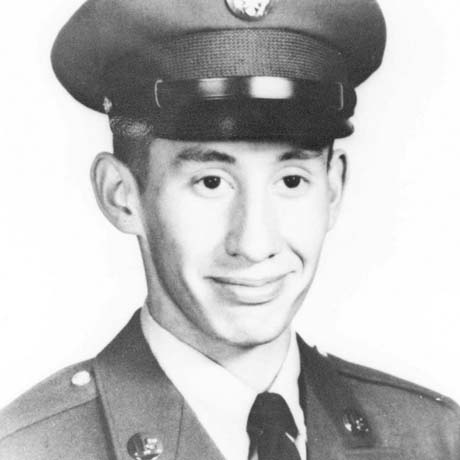
Specialist Four
Daniel D. Fernández
1966: Vietnam War
READ MOREDaniel D. Fernández
 1966: Vietnam War
1966: Vietnam War
For conspicuous gallantry and intrepidity at the risk of his life above and beyond the call of duty. Spc. 4 Fernandez demonstrated indomitable courage when the patrol was ambushed by a Viet Cong rifle company and driven back by the intense enemy automatic-weapons fire before it could evacuate an American soldier who had been wounded in the Viet Cong attack. Spc. 4 Fernandez, a sergeant, and two other volunteers immediately fought their way through devastating fire and exploding grenades to reach the fallen soldier. Upon reaching their fallen comrade the sergeant was struck in the knee by machine-gun fire and immobilized. Spc. 4 Fernandez took charge, rallied the left flank of his patrol, and began to assist in the recovery of the wounded sergeant. While first aid was being administered to the wounded man, a sudden increase in the accuracy and intensity of the enemy fire forced the volunteer group to take cover. As they did, an enemy grenade landed in the midst of the group, although some men did not see it. Realizing there was no time for the wounded sergeant or the other men to protect themselves from the grenade blast, Spc. 4 Fernandez vaulted over the wounded sergeant and threw himself on the grenade as it exploded, saving the lives of his four comrades at the sacrifice of his life. Spc. 4 Fernandez' profound concern for his fellow soldiers, at the risk of his life above and beyond the call of duty, are in the highest traditions of the U.S. Army and reflect great credit upon himself and the Armed Forces of his country.
Related Articles
Official page - Congressional Medal of Honor Society
Specialist Four Daniel D. Fernández
1966: Vietnam War
For conspicuous gallantry and intrepidity at the risk of his life above and beyond the call of duty. Spc. 4 Fernandez demonstrated indomitable courage when the patrol was ambushed by a Viet Cong rifle company and driven back by the intense enemy automatic-weapons fire before it could evacuate an American soldier who had been wounded in the Viet Cong attack. Spc. 4 Fernandez, a sergeant, and two other volunteers immediately fought their way through devastating fire and exploding grenades to reach the fallen soldier. Upon reaching their fallen comrade the sergeant was struck in the knee by machine-gun fire and immobilized. Spc. 4 Fernandez took charge, rallied the left flank of his patrol, and began to assist in the recovery of the wounded sergeant. While first aid was being administered to the wounded man, a sudden increase in the accuracy and intensity of the enemy fire forced the volunteer group to take cover. As they did, an enemy grenade landed in the midst of the group, although some men did not see it. Realizing there was no time for the wounded sergeant or the other men to protect themselves from the grenade blast, Spc. 4 Fernandez vaulted over the wounded sergeant and threw himself on the grenade as it exploded, saving the lives of his four comrades at the sacrifice of his life. Spc. 4 Fernandez' profound concern for his fellow soldiers, at the risk of his life above and beyond the call of duty, are in the highest traditions of the U.S. Army and reflect great credit upon himself and the Armed Forces of his country.
Related Articles
Official page - Congressional Medal of Honor Society
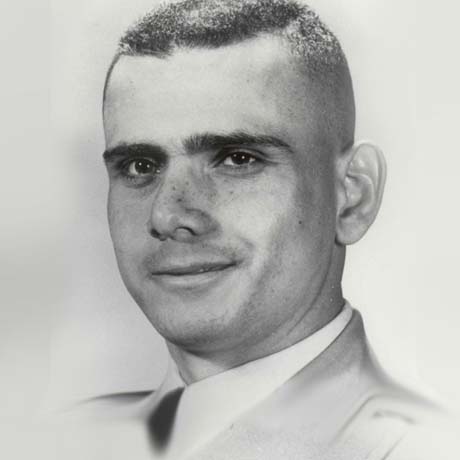
Captain
Euripides Rubio
1966: Vietnam War
READ MOREEuripides Rubio
 1966: Vietnam War
1966: Vietnam War
For conspicuous gallantry and intrepidity in action at the risk of his life above and beyond the call of duty. Capt. Rubio, Infantry, was serving as communications officer, 1st Battalion, when a numerically superior enemy force launched a massive attack against the battalion defense position. Intense enemy machine-gun fire raked the area while mortar rounds and rifle grenades exploded within the perimeter. Leaving the relative safety of his post, Capt. Rubio received two serious wounds as he braved the withering fire to go to the area of most intense action where he distributed ammunition, reestablished positions, and rendered aid to the wounded. Disregarding the painful wounds, he unhesitatingly assumed command when a rifle company commander was medically evacuated. Capt. Rubio was wounded a third time as he selflessly exposed himself to the devastating enemy fire to move among his men to encourage them to fight with renewed effort. While aiding the evacuation of wounded personnel, he noted that a smoke grenade which was intended to mark the Viet Cong position for air strikes had fallen dangerously close to the friendly lines. Capt. Rubio ran to reposition the grenade but was immediately struck to his knees by enemy fire. Despite his several wounds, Capt. Rubio scooped up the grenade, ran through the deadly hail of fire to within 20 meters of the enemy position and hurled the already smoking grenade into the midst of the enemy before he fell for the final time. Using the reposition grenade as a marker, friendly air strikes were directed to destroy the hostile positions. Capt. Rubio's singularly heroic act turned the tide of battle, and his extraordinary leadership and valor were a magnificent inspiration to his men. His remarkable bravery and selfless concern for his men are in keeping with the highest traditions of the military service and reflect great credit on Capt. Rubio and the U.S. Army.
Related Articles
Official page - Congressional Medal of Honor Society
Captain Euripides Rubio
1966: Vietnam War
For conspicuous gallantry and intrepidity in action at the risk of his life above and beyond the call of duty. Capt. Rubio, Infantry, was serving as communications officer, 1st Battalion, when a numerically superior enemy force launched a massive attack against the battalion defense position. Intense enemy machine-gun fire raked the area while mortar rounds and rifle grenades exploded within the perimeter. Leaving the relative safety of his post, Capt. Rubio received two serious wounds as he braved the withering fire to go to the area of most intense action where he distributed ammunition, reestablished positions, and rendered aid to the wounded. Disregarding the painful wounds, he unhesitatingly assumed command when a rifle company commander was medically evacuated. Capt. Rubio was wounded a third time as he selflessly exposed himself to the devastating enemy fire to move among his men to encourage them to fight with renewed effort. While aiding the evacuation of wounded personnel, he noted that a smoke grenade which was intended to mark the Viet Cong position for air strikes had fallen dangerously close to the friendly lines. Capt. Rubio ran to reposition the grenade but was immediately struck to his knees by enemy fire. Despite his several wounds, Capt. Rubio scooped up the grenade, ran through the deadly hail of fire to within 20 meters of the enemy position and hurled the already smoking grenade into the midst of the enemy before he fell for the final time. Using the reposition grenade as a marker, friendly air strikes were directed to destroy the hostile positions. Capt. Rubio's singularly heroic act turned the tide of battle, and his extraordinary leadership and valor were a magnificent inspiration to his men. His remarkable bravery and selfless concern for his men are in keeping with the highest traditions of the military service and reflect great credit on Capt. Rubio and the U.S. Army.
Related Articles
Official page - Congressional Medal of Honor Society
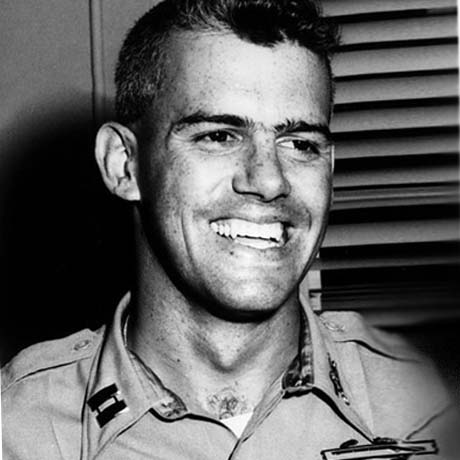
Captain
Humbert Roque Versace
1965: Vietnam War
READ MOREHumbert Roque Versace
 1965: Vietnam War
1965: Vietnam War
Capt. Humbert R. Versace distinguished himself by extraordinary heroism during the period of 29 October 1963 to 26 September 1965 while serving as an S-2 Adviser, Military Assistance Advisory Group, Detachment 52, Ca Mau, Republic of Vietnam. While accompanying a Civilian Irregular Defense Group patrol engaged in combat operations in Thoi Binh District, An Xuyen Province, Capt. Versace and the patrol came under sudden and intense mortar, automatic weapons, and small arms fire from elements of a heavily armed enemy battalion. As the battle raged, Capt. Versace, although severely wounded in the knee and back by hostile fire, fought valiantly and continued to engaged enemy targets. Weakened by his wounds and fatigued by the fierce firefight, Capt. Versace stubbornly resisted capture by the over-powering Viet Cong force with the last full measure of his strength and ammunition. Taken prisoner by the Viet Cong, he exemplified the tenets of the Code of Conduct from the time he entered into Prisoner of War status. Capt. Versace assumed command of his fellow American soldiers, scorned the enemy's exhaustive interrogation and indoctrination efforts, and made three unsuccessful attempts to escape, despite his weakened condition which was brought about by his wounds and the extreme privation and hardships he was forced to endure. During his captivity, Capt. Versace was segregated in an isolated prisoner of war cage, manacled in irons for prolonged periods of time, and placed on extremely reduced ration. The enemy was unable to break his indomitable will, his faith in God, and his trust in the United States of America. Capt. Versace, an American fighting man who epitomized the principles of his country and the Code of Conduct, was executed by the Viet Cong on 26 September 1965. Capt. Versace's gallant actiona in close contact with an enemy force and unyielding courage and bravery while a prisoner of war are in the highest traditions of the military service and reflect the utmost credit upon himself and the United States Army.
Related Articles
Official page - Congressional Medal of Honor Society
Captain Humbert Roque Versace
1965: Vietnam War
Capt. Humbert R. Versace distinguished himself by extraordinary heroism during the period of 29 October 1963 to 26 September 1965 while serving as an S-2 Adviser, Military Assistance Advisory Group, Detachment 52, Ca Mau, Republic of Vietnam. While accompanying a Civilian Irregular Defense Group patrol engaged in combat operations in Thoi Binh District, An Xuyen Province, Capt. Versace and the patrol came under sudden and intense mortar, automatic weapons, and small arms fire from elements of a heavily armed enemy battalion. As the battle raged, Capt. Versace, although severely wounded in the knee and back by hostile fire, fought valiantly and continued to engaged enemy targets. Weakened by his wounds and fatigued by the fierce firefight, Capt. Versace stubbornly resisted capture by the over-powering Viet Cong force with the last full measure of his strength and ammunition. Taken prisoner by the Viet Cong, he exemplified the tenets of the Code of Conduct from the time he entered into Prisoner of War status. Capt. Versace assumed command of his fellow American soldiers, scorned the enemy's exhaustive interrogation and indoctrination efforts, and made three unsuccessful attempts to escape, despite his weakened condition which was brought about by his wounds and the extreme privation and hardships he was forced to endure. During his captivity, Capt. Versace was segregated in an isolated prisoner of war cage, manacled in irons for prolonged periods of time, and placed on extremely reduced ration. The enemy was unable to break his indomitable will, his faith in God, and his trust in the United States of America. Capt. Versace, an American fighting man who epitomized the principles of his country and the Code of Conduct, was executed by the Viet Cong on 26 September 1965. Capt. Versace's gallant actiona in close contact with an enemy force and unyielding courage and bravery while a prisoner of war are in the highest traditions of the military service and reflect the utmost credit upon himself and the United States Army.
Related Articles
Official page - Congressional Medal of Honor Society
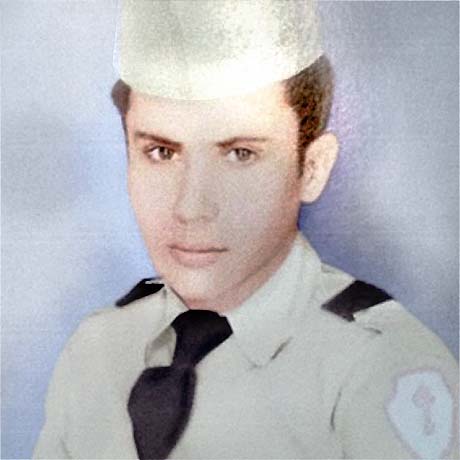
Private
Miguel A. Vera
1952: Korean War
READ MOREMiguel A. Vera
 1952: Korean War
1952: Korean War
Pvt. Miguel A. Vera distinguished himself by acts of gallantry and intrepidity above and beyond the call of duty while serving as an automatic rifleman with Company F, 38th Infantry Regiment, 2d Infantry Division in Chorwon, Korea, on September 21, 1952. That morning, despite suffering from wounds inflicted in a previous battle, Pvt. Vera voluntarily left the aid station to join his comrades in an attack against well-fortified enemy positions on a hill of great importance. When the assaulting elements had moved within twenty yards of the enemy positions, they were suddenly trapped by a heavy volume of mortar, artillery and small-arms fire. The company prepared to make a limited withdrawal, but Pvt. Vera volunteered to remain behind to provide covering fire. As his companions moved to safety, Pvt. Vera remained steadfast in his position, directing accurate fire against the hostile positions despite the intense volume of fire which the enemy was concentrating upon him. Later in the morning, when the friendly force returned, they discovered Pvt. Vera in the same position, facing the enemy. Pvt. Vera's noble intrepidity and self-sacrifice saved many of his comrades' lives. Pvt. Vera's extraordinary heroism and selflessness at the cost of his own life, above and beyond the call of duty, are in keeping with the highest traditions of the military service and reflect great credit upon himself, his unit and the United States Army.
Related Articles
Official page - Congressional Medal of Honor Society
Private Miguel A. Vera
1952: Korean War
Pvt. Miguel A. Vera distinguished himself by acts of gallantry and intrepidity above and beyond the call of duty while serving as an automatic rifleman with Company F, 38th Infantry Regiment, 2d Infantry Division in Chorwon, Korea, on September 21, 1952. That morning, despite suffering from wounds inflicted in a previous battle, Pvt. Vera voluntarily left the aid station to join his comrades in an attack against well-fortified enemy positions on a hill of great importance. When the assaulting elements had moved within twenty yards of the enemy positions, they were suddenly trapped by a heavy volume of mortar, artillery and small-arms fire. The company prepared to make a limited withdrawal, but Pvt. Vera volunteered to remain behind to provide covering fire. As his companions moved to safety, Pvt. Vera remained steadfast in his position, directing accurate fire against the hostile positions despite the intense volume of fire which the enemy was concentrating upon him. Later in the morning, when the friendly force returned, they discovered Pvt. Vera in the same position, facing the enemy. Pvt. Vera's noble intrepidity and self-sacrifice saved many of his comrades' lives. Pvt. Vera's extraordinary heroism and selflessness at the cost of his own life, above and beyond the call of duty, are in keeping with the highest traditions of the military service and reflect great credit upon himself, his unit and the United States Army.
Related Articles
Official page - Congressional Medal of Honor Society
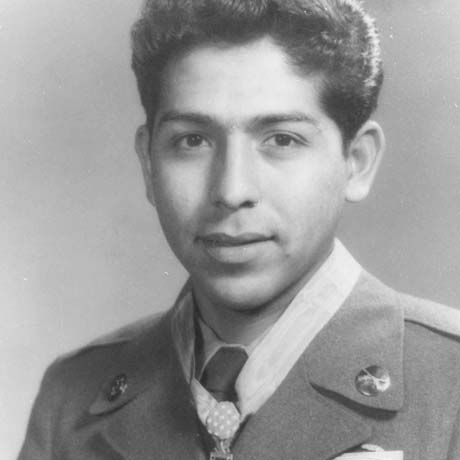
Private
Joseph C. Rodriguez
1951: Korean War
READ MOREJoseph C. Rodriguez
 1951: Korean War
1951: Korean War
Then-Pvt. Rodriguez distinguished himself by conspicuous gallantry and intrepidity at the risk of his life above and beyond the call of duty in action against an armed enemy of the Unites Nations. Pvt. Rodriguez, an assistant squad leader of the 2d Platoon, was participating in an attack against a fanatical hostile force occupying well-fortified positions on rugged command terrain, when his squad's advance was halted within approximately 60 yards by a withering barrage of automatic-weapons and small-arms fire from five emplacements directly to the front and right and left flanks, together with grenades which the enemy rolled down the hill toward the advancing troops. Fully aware of the odds against him, Pvt. Rodriguez leaped to his feet, dashed 60 yards up the fire-swept slope, and, after lobbing grenades into the first foxhole with deadly accuracy, ran around the left flank, silenced an automatic weapon with two grenades and continued his whirlwind assault to the top of the peak, wiping out two more foxholes and then, reaching the right flank, he tossed grenades into the remaining emplacement, destroying the gun and annihilating its crew. Pvt. Rodriguez' intrepid actions exacted a toll of 15 enemy dead and, as a result of his incredible display of valor, the defense of the opposition was broken, and the enemy routed, and the strategic strongpoint secured. His unflinching courage under fire and inspirational devotion to duty reflect highest credit on himself and uphold the honored traditions of the military service.
Related Articles
Official page - Congressional Medal of Honor Society
Private Joseph C. Rodriguez
1951: Korean War
Then-Pvt. Rodriguez distinguished himself by conspicuous gallantry and intrepidity at the risk of his life above and beyond the call of duty in action against an armed enemy of the Unites Nations. Pvt. Rodriguez, an assistant squad leader of the 2d Platoon, was participating in an attack against a fanatical hostile force occupying well-fortified positions on rugged command terrain, when his squad's advance was halted within approximately 60 yards by a withering barrage of automatic-weapons and small-arms fire from five emplacements directly to the front and right and left flanks, together with grenades which the enemy rolled down the hill toward the advancing troops. Fully aware of the odds against him, Pvt. Rodriguez leaped to his feet, dashed 60 yards up the fire-swept slope, and, after lobbing grenades into the first foxhole with deadly accuracy, ran around the left flank, silenced an automatic weapon with two grenades and continued his whirlwind assault to the top of the peak, wiping out two more foxholes and then, reaching the right flank, he tossed grenades into the remaining emplacement, destroying the gun and annihilating its crew. Pvt. Rodriguez' intrepid actions exacted a toll of 15 enemy dead and, as a result of his incredible display of valor, the defense of the opposition was broken, and the enemy routed, and the strategic strongpoint secured. His unflinching courage under fire and inspirational devotion to duty reflect highest credit on himself and uphold the honored traditions of the military service.
Related Articles
Official page - Congressional Medal of Honor Society
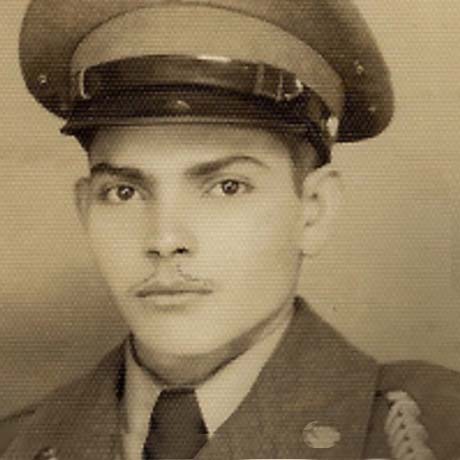
Private
Demensio Rivera
1951: Korean War
READ MOREDemensio Rivera
 1951: Korean War
1951: Korean War
Pvt. Demensio Rivera distinguished himself by acts of gallantry and intrepidity above and beyond the call of duty while serving as an automatic rifleman with 2d Platoon, Company G, 7th Infantry Regiment, 3d Infantry Division during combat operations against an armed enemy in Changyong-ni, Korea on May 23, 1951. Early that morning, a large hostile force emerged from a dense fog and viciously attacked Pvt. Rivera and his comrades. Pvt. Rivera immediately responded by firing with deadly accuracy until his weapon jammed. Without hesitating, he threw his rifle down and began to engage the enemy with his pistol and grenades. At one point, Pvt. Rivera fearlessly crawled from his emplacement to engage an infiltrating enemy soldier in fierce hand-to-hand combat. With only the sound of footsteps and obscure shadows to guide his aim, Pvt. Rivera held his position against tremendous odds, inflicting numerous casualties on the enemy until he found himself without ammunition of any kind except one grenade. Displaying a peerless fighting spirit and an utterly selfless devotion to duty, Pvt. Rivera pulled the pin from his last grenade and calmly waited for the enemy to reach his position. As enemy troops leaped inside his bunker, Pvt. Rivera activated the grenade with the full knowledge that it meant his almost certain death. When the debris from the explosion had cleared, friendly forces recovered a severely wounded Pvt. Rivera and discovered the bodies of four dead or dying enemy soldiers surrounding him. Pvt. Rivera's extraordinary heroism and selflessness above and beyond the call of duty are in keeping with the highest traditions of military service and reflect great credit upon himself, his unit and the United States
Related Articles
Official page - Congressional Medal of Honor Society
Private Demensio Rivera
1951: Korean War
Pvt. Demensio Rivera distinguished himself by acts of gallantry and intrepidity above and beyond the call of duty while serving as an automatic rifleman with 2d Platoon, Company G, 7th Infantry Regiment, 3d Infantry Division during combat operations against an armed enemy in Changyong-ni, Korea on May 23, 1951. Early that morning, a large hostile force emerged from a dense fog and viciously attacked Pvt. Rivera and his comrades. Pvt. Rivera immediately responded by firing with deadly accuracy until his weapon jammed. Without hesitating, he threw his rifle down and began to engage the enemy with his pistol and grenades. At one point, Pvt. Rivera fearlessly crawled from his emplacement to engage an infiltrating enemy soldier in fierce hand-to-hand combat. With only the sound of footsteps and obscure shadows to guide his aim, Pvt. Rivera held his position against tremendous odds, inflicting numerous casualties on the enemy until he found himself without ammunition of any kind except one grenade. Displaying a peerless fighting spirit and an utterly selfless devotion to duty, Pvt. Rivera pulled the pin from his last grenade and calmly waited for the enemy to reach his position. As enemy troops leaped inside his bunker, Pvt. Rivera activated the grenade with the full knowledge that it meant his almost certain death. When the debris from the explosion had cleared, friendly forces recovered a severely wounded Pvt. Rivera and discovered the bodies of four dead or dying enemy soldiers surrounding him. Pvt. Rivera's extraordinary heroism and selflessness above and beyond the call of duty are in keeping with the highest traditions of military service and reflect great credit upon himself, his unit and the United States
Related Articles
Official page - Congressional Medal of Honor Society
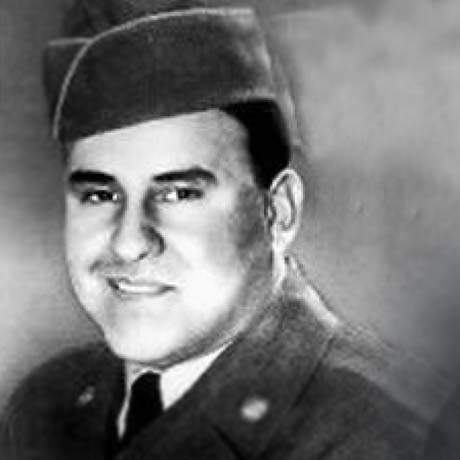
Corporal
Benito Martinez
1952: Korean War
READ MOREBenito Martinez
 1952: Korean War
1952: Korean War
Cpl. Martinez, a machine gunner with Company A, distinguished himself by conspicuous gallantry and outstanding courage above and beyond the call of duty in action against the enemy. While manning a listening post forward of the main line of resistance, his position was attacked by a hostile force of reinforced company strength. In the bitter fighting which ensued, the enemy infiltrated the defense perimeter and, realizing that encirclement was imminent, Cpl. Martinez elected to remain at his post in an attempt to stem the onslaught. In a daring defense, he raked the attacking troops with crippling fire, inflicting numerous casualties. Although contacted by sound power phone several times, he insisted that no attempt be made to rescue him because of the danger involved. Soon thereafter, the hostile forces rushed the emplacement, forcing him to make a limited withdrawal with only an automatic rifle and pistol to defend himself. After a courageous six-hour stand and shortly before dawn, he called in for the last time, stating that the enemy was converging on his position. His magnificent stand enabled friendly elements to reorganize, attack, and regain the key terrain. Cpl. Martinez' incredible valor and supreme sacrifice reflect lasting glory upon himself and are in keeping with the honored traditions of the military service.
Related Articles
Official page - Congressional Medal of Honor Society
Corporal Benito Martinez
1952: Korean War
Cpl. Martinez, a machine gunner with Company A, distinguished himself by conspicuous gallantry and outstanding courage above and beyond the call of duty in action against the enemy. While manning a listening post forward of the main line of resistance, his position was attacked by a hostile force of reinforced company strength. In the bitter fighting which ensued, the enemy infiltrated the defense perimeter and, realizing that encirclement was imminent, Cpl. Martinez elected to remain at his post in an attempt to stem the onslaught. In a daring defense, he raked the attacking troops with crippling fire, inflicting numerous casualties. Although contacted by sound power phone several times, he insisted that no attempt be made to rescue him because of the danger involved. Soon thereafter, the hostile forces rushed the emplacement, forcing him to make a limited withdrawal with only an automatic rifle and pistol to defend himself. After a courageous six-hour stand and shortly before dawn, he called in for the last time, stating that the enemy was converging on his position. His magnificent stand enabled friendly elements to reorganize, attack, and regain the key terrain. Cpl. Martinez' incredible valor and supreme sacrifice reflect lasting glory upon himself and are in keeping with the honored traditions of the military service.
Related Articles
Official page - Congressional Medal of Honor Society
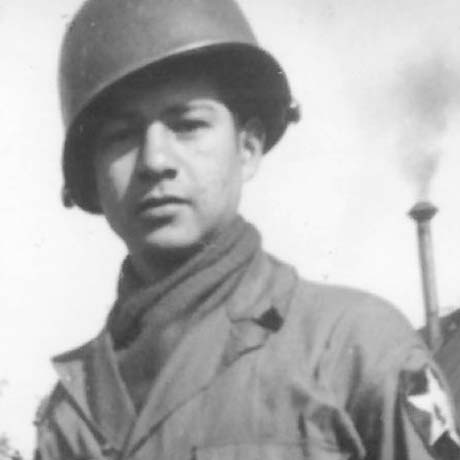
Corporal
Victor H. Espinoza
1952: Korean War
READ MOREVictor H. Espinoza
 1952: Korean War
1952: Korean War
Cpl. Victor H. Espinoza distinguished himself by acts of gallantry and intrepidity above and beyond the call of duty while serving as an Acting Rifleman in Company A, 23d Infantry Regiment, 2d Infantry Division during combat operations against an armed enemy in Chorwon, Korea on August 1, 1952. On that day, Cpl. Espinoza and his unit were responsible for securing and holding a vital enemy hill. As the friendly unit neared its objective, it was subjected to a devastating volume of enemy fire, slowing its progress. Cpl. Espinoza, unhesitatingly and being fully aware of the hazards involved, left his place of comparative safety and made a deliberate one man assault on the enemy with his rifle and grenades, destroying a machinegun and killing its crew. Cpl. Espinoza continued across the fire-swept terrain to an exposed vantage point where he attacked an enemy mortar position and two bunkers with grenades and rifle fire, knocking out the enemy mortar position and destroying both bunkers and killing their occupants. Upon reaching the crest, and after running out of rifle ammunition, he called for more grenades. A comrade who was behind him threw some Chinese grenades to him. Immediately upon catching them, he pulled the pins and hurled them into the occupied trenches, killing and wounding more of the enemy with their own weapons. Continuing on through a tunnel, Cpl. Espinoza made a daring charge, inflicting at least seven more casualties upon the enemy who were fast retreating into the tunnel. Cpl. Espinoza was quickly in pursuit, but the hostile fire from the opening prevented him from overtaking the retreating enemy. As a result, Cpl. Espinoza destroyed the tunnel with TNT, called for more grenades from his company, and hurled them at the enemy troops until they were out of reach. Cpl. Espinoza's incredible display of valor secured the vital strong point and took a heavy toll on the enemy, resulting in at least fourteen dead and eleven wounded. Cpl. Espinoza's extraordinary heroism and selflessness above and beyond the call of duty are in keeping with the highest traditions of military service and reflect great credit upon himself, his unit and the United States Army.
Related Articles
Official page - Congressional Medal of Honor Society
Corporal Victor H. Espinoza
1952: Korean War
Cpl. Victor H. Espinoza distinguished himself by acts of gallantry and intrepidity above and beyond the call of duty while serving as an Acting Rifleman in Company A, 23d Infantry Regiment, 2d Infantry Division during combat operations against an armed enemy in Chorwon, Korea on August 1, 1952. On that day, Cpl. Espinoza and his unit were responsible for securing and holding a vital enemy hill. As the friendly unit neared its objective, it was subjected to a devastating volume of enemy fire, slowing its progress. Cpl. Espinoza, unhesitatingly and being fully aware of the hazards involved, left his place of comparative safety and made a deliberate one man assault on the enemy with his rifle and grenades, destroying a machinegun and killing its crew. Cpl. Espinoza continued across the fire-swept terrain to an exposed vantage point where he attacked an enemy mortar position and two bunkers with grenades and rifle fire, knocking out the enemy mortar position and destroying both bunkers and killing their occupants. Upon reaching the crest, and after running out of rifle ammunition, he called for more grenades. A comrade who was behind him threw some Chinese grenades to him. Immediately upon catching them, he pulled the pins and hurled them into the occupied trenches, killing and wounding more of the enemy with their own weapons. Continuing on through a tunnel, Cpl. Espinoza made a daring charge, inflicting at least seven more casualties upon the enemy who were fast retreating into the tunnel. Cpl. Espinoza was quickly in pursuit, but the hostile fire from the opening prevented him from overtaking the retreating enemy. As a result, Cpl. Espinoza destroyed the tunnel with TNT, called for more grenades from his company, and hurled them at the enemy troops until they were out of reach. Cpl. Espinoza's incredible display of valor secured the vital strong point and took a heavy toll on the enemy, resulting in at least fourteen dead and eleven wounded. Cpl. Espinoza's extraordinary heroism and selflessness above and beyond the call of duty are in keeping with the highest traditions of military service and reflect great credit upon himself, his unit and the United States Army.
Related Articles
Official page - Congressional Medal of Honor Society
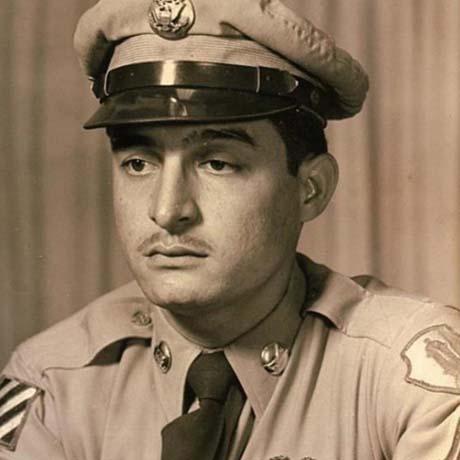
Sergeant
Juan E. Negrón
1951: Korean War
READ MOREJuan E. Negrón
 1951: Korean War
1951: Korean War
Then-Sgt. Juan E. Negron distinguished himself by acts of gallantry and intrepidity above and beyond the call of duty while serving as a member of Company L, 65th Infantry Regiment, 3d Infantry Division during combat operations against an armed enemy in Kalma-Eri, Korea on April 28, 1951. That afternoon, Sgt. Negron took up the most vulnerable position on his company's exposed right flank after an enemy force had overrun a section of the line. When notified that elements of his company were withdrawing, Sgt. Negron refused to leave his exposed position, instead delivering withering fire at hostile troops who had broken through a road block. When the hostile troops approached his position, Sgt. Negron accurately hurled hand grenades at short range, halting their attack. Sgt. Negron held the position throughout the night while friendly forces organized and launched a counterattack. The next morning, after the enemy had been repulsed, friendly forces relieved Sgt. Negron and found the bodies of fifteen enemy soldiers surrounding his position. Sgt. Negron's extraordinary heroism and selflessness above and beyond the call of duty are in keeping with the highest traditions of military service and reflect great credit upon himself, his unit and the United States Army.
Related Articles
Official page - Congressional Medal of Honor Society
Sergeant Juan E. Negrón
1951: Korean War
Then-Sgt. Juan E. Negron distinguished himself by acts of gallantry and intrepidity above and beyond the call of duty while serving as a member of Company L, 65th Infantry Regiment, 3d Infantry Division during combat operations against an armed enemy in Kalma-Eri, Korea on April 28, 1951. That afternoon, Sgt. Negron took up the most vulnerable position on his company's exposed right flank after an enemy force had overrun a section of the line. When notified that elements of his company were withdrawing, Sgt. Negron refused to leave his exposed position, instead delivering withering fire at hostile troops who had broken through a road block. When the hostile troops approached his position, Sgt. Negron accurately hurled hand grenades at short range, halting their attack. Sgt. Negron held the position throughout the night while friendly forces organized and launched a counterattack. The next morning, after the enemy had been repulsed, friendly forces relieved Sgt. Negron and found the bodies of fifteen enemy soldiers surrounding his position. Sgt. Negron's extraordinary heroism and selflessness above and beyond the call of duty are in keeping with the highest traditions of military service and reflect great credit upon himself, his unit and the United States Army.
Related Articles
Official page - Congressional Medal of Honor Society
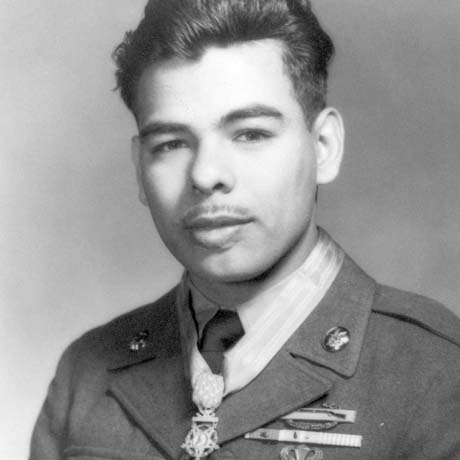
Corporal
Rodolfo P. Hernandez
1951: Korean War
READ MORERodolfo P. Hernandez
 1951: Korean War
1951: Korean War
Cpl. Hernandez, a member of Company G, distinguished himself by conspicuous gallantry and intrepidity above and beyond the call of duty in action against the enemy. His platoon, in defensive positions on Hill 420, came under ruthless attack by a numerically superior and fanatical hostile force, accompanied by heavy artillery, mortar, and machine-gun fire which inflicted numerous casualties on the platoon. His comrades were forced to withdraw due to lack of ammunition, but Cpl. Hernandez, although wounded in an exchange of grenades, continued to deliver deadly fire into the ranks of the onrushing assailants until a ruptured cartridge rendered his rifle inoperative. Immediately leaving his position, Cpl. Hernandez rushed the enemy armed only with rifle and bayonet. Fearlessly engaging the foe, he killed six of the enemy before falling unconscious from grenade, bayonet, and bullet wounds, but his heroic action momentarily halted the enemy advance and enabled his unit to counterattack and retake the lost ground. The indomitable fighting spirit, outstanding courage, and tenacious devotion to duty clearly demonstrated by Cpl. Hernandez reflect the highest credit upon himself, the infantry, and the U.S. Army.
Related Articles
Official page - Congressional Medal of Honor Society
Corporal Rodolfo P. Hernandez
1951: Korean War
Cpl. Hernandez, a member of Company G, distinguished himself by conspicuous gallantry and intrepidity above and beyond the call of duty in action against the enemy. His platoon, in defensive positions on Hill 420, came under ruthless attack by a numerically superior and fanatical hostile force, accompanied by heavy artillery, mortar, and machine-gun fire which inflicted numerous casualties on the platoon. His comrades were forced to withdraw due to lack of ammunition, but Cpl. Hernandez, although wounded in an exchange of grenades, continued to deliver deadly fire into the ranks of the onrushing assailants until a ruptured cartridge rendered his rifle inoperative. Immediately leaving his position, Cpl. Hernandez rushed the enemy armed only with rifle and bayonet. Fearlessly engaging the foe, he killed six of the enemy before falling unconscious from grenade, bayonet, and bullet wounds, but his heroic action momentarily halted the enemy advance and enabled his unit to counterattack and retake the lost ground. The indomitable fighting spirit, outstanding courage, and tenacious devotion to duty clearly demonstrated by Cpl. Hernandez reflect the highest credit upon himself, the infantry, and the U.S. Army.
Related Articles
Official page - Congressional Medal of Honor Society
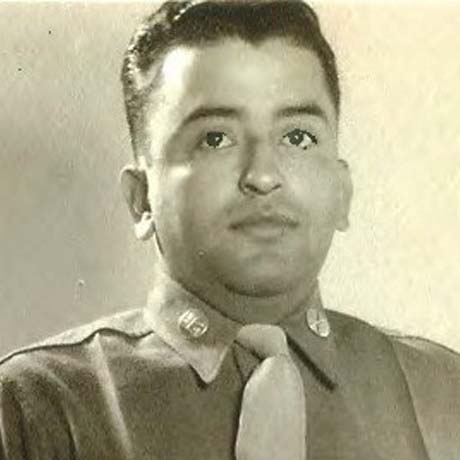
Sergeant
Eduardo C. Gomez
1950: Korean War
READ MOREEduardo C. Gomez
 1950: Korean War
1950: Korean War
Sgt. Eduardo C. Gomez distinguished himself by acts of gallantry and intrepidity above and beyond the call of duty while serving with Company I, 8th Cavalry Regiment, 1st Cavalry Division during combat operations against an armed enemy in Tabu-dong, Korea on September 3, 1950. That afternoon, while conducting combat patrol, Sgt. Gomez' company was ruthlessly attacked by a hostile force which moved within seventy-five yards of the command post before it was immobilized by rocket fire. However, an enemy tank and multiple enemy machineguns continued to rake the company perimeter with devastating fire. Realizing the tank posed a serious threat to the entire perimeter, Sgt. Gomez voluntarily crawled thirty yards across an open rice field vulnerable to enemy observation and fire, boarded the tank, pried open one of the hatches on the turret and dropped an activated grenade into the hull, killing the crew. Wounded in the left side while returning to his position, Sgt. Gomez refused evacuation. Observing that the tripod of a .30 caliber machinegun was rendered inoperable by enemy fire, he cradled the weapon in his arms, returned to the forward defensive positions, and swept the assaulting force with withering fire. Although his weapon overheated and burned his hands and his painful wound still bled, Sgt. Gomez maintained his stand and, upon orders to withdraw in the face of overwhelming enemy superiority, remained to provide protective fire. Sgt. Gomez continued to pour accurate fire into the enemy ranks, exacting a heavy toll in casualties and retarding their advance. Sgt. Gomez would not consent to leave his post for medical attention until the company established new defensive positions. Sgt. Gomez's extraordinary heroism and selflessness above and beyond the call of duty are in keeping with the highest traditions of military service and reflect great credit upon himself, his unit and the United States Army.
Related Articles
Official page - Congressional Medal of Honor Society
Sergeant Eduardo C. Gomez
1950: Korean War
Sgt. Eduardo C. Gomez distinguished himself by acts of gallantry and intrepidity above and beyond the call of duty while serving with Company I, 8th Cavalry Regiment, 1st Cavalry Division during combat operations against an armed enemy in Tabu-dong, Korea on September 3, 1950. That afternoon, while conducting combat patrol, Sgt. Gomez' company was ruthlessly attacked by a hostile force which moved within seventy-five yards of the command post before it was immobilized by rocket fire. However, an enemy tank and multiple enemy machineguns continued to rake the company perimeter with devastating fire. Realizing the tank posed a serious threat to the entire perimeter, Sgt. Gomez voluntarily crawled thirty yards across an open rice field vulnerable to enemy observation and fire, boarded the tank, pried open one of the hatches on the turret and dropped an activated grenade into the hull, killing the crew. Wounded in the left side while returning to his position, Sgt. Gomez refused evacuation. Observing that the tripod of a .30 caliber machinegun was rendered inoperable by enemy fire, he cradled the weapon in his arms, returned to the forward defensive positions, and swept the assaulting force with withering fire. Although his weapon overheated and burned his hands and his painful wound still bled, Sgt. Gomez maintained his stand and, upon orders to withdraw in the face of overwhelming enemy superiority, remained to provide protective fire. Sgt. Gomez continued to pour accurate fire into the enemy ranks, exacting a heavy toll in casualties and retarding their advance. Sgt. Gomez would not consent to leave his post for medical attention until the company established new defensive positions. Sgt. Gomez's extraordinary heroism and selflessness above and beyond the call of duty are in keeping with the highest traditions of military service and reflect great credit upon himself, his unit and the United States Army.
Related Articles
Official page - Congressional Medal of Honor Society
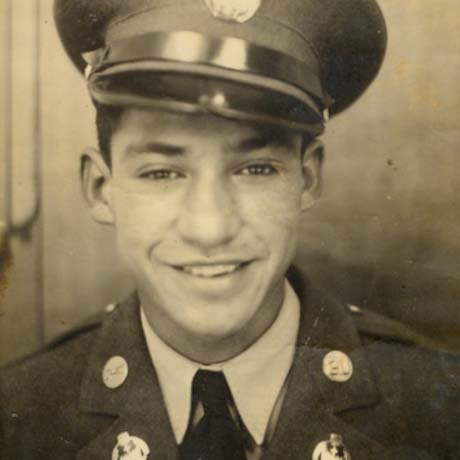
Master Sergeant
Mike C. Pena
1950: Korean War
READ MOREMike C. Pena
 1950: Korean War
1950: Korean War
Master Sgt. Mike C. Pena distinguished himself by acts of gallantry and intrepidity above and beyond the call of duty while serving as a member of Company F, 5th Cavalry Regiment, 1st Cavalry Division during combat operations against an armed enemy in Waegwan, Korea, on September 4, 1950. That evening, under cover of darkness and a dreary mist, an enemy battalion moved to within a few yards of Master Sgt. Pena's platoon. Recognizing the enemy's approach, Master Sgt. Pena and his men opened fire, but the enemy's sudden emergence and accurate, point blank fire forced the friendly troops to withdraw. Master Sgt. Pena rapidly reorganized his men and led them in a counterattack which succeeded in regaining the positions they had just lost. He and his men quickly established a defensive perimeter and laid down devastating fire, but enemy troops continued to hurl themselves at the defenses in overwhelming numbers. Realizing that their scarce supply of ammunition would soon make their positions untenable, Master Sgt. Pena ordered his men to fall back and manned a machinegun to cover their withdrawal. He singlehandedly held back the enemy until the early hours of the following morning when his position was overrun and he was killed. Master Sgt. Pena's extraordinary heroism and selflessness at the cost of his own life, above and beyond the call of duty, are in keeping with the highest traditions of military service and reflect great credit upon himself, his unit and the United States Army.
Related Articles
Official page - Congressional Medal of Honor Society
Master Sergeant Mike C. Pena
1950: Korean War
Master Sgt. Mike C. Pena distinguished himself by acts of gallantry and intrepidity above and beyond the call of duty while serving as a member of Company F, 5th Cavalry Regiment, 1st Cavalry Division during combat operations against an armed enemy in Waegwan, Korea, on September 4, 1950. That evening, under cover of darkness and a dreary mist, an enemy battalion moved to within a few yards of Master Sgt. Pena's platoon. Recognizing the enemy's approach, Master Sgt. Pena and his men opened fire, but the enemy's sudden emergence and accurate, point blank fire forced the friendly troops to withdraw. Master Sgt. Pena rapidly reorganized his men and led them in a counterattack which succeeded in regaining the positions they had just lost. He and his men quickly established a defensive perimeter and laid down devastating fire, but enemy troops continued to hurl themselves at the defenses in overwhelming numbers. Realizing that their scarce supply of ammunition would soon make their positions untenable, Master Sgt. Pena ordered his men to fall back and manned a machinegun to cover their withdrawal. He singlehandedly held back the enemy until the early hours of the following morning when his position was overrun and he was killed. Master Sgt. Pena's extraordinary heroism and selflessness at the cost of his own life, above and beyond the call of duty, are in keeping with the highest traditions of military service and reflect great credit upon himself, his unit and the United States Army.
Related Articles
Official page - Congressional Medal of Honor Society
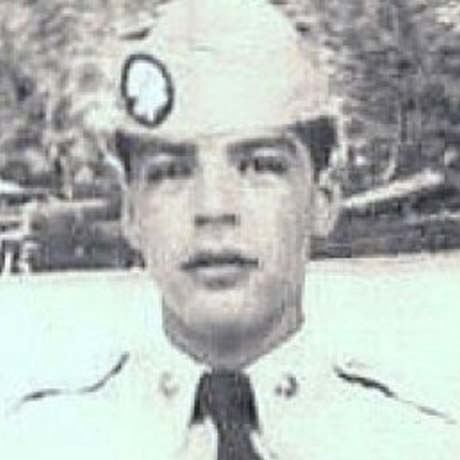
Corporal
Joe R. Baldonado
1950: Korean War
READ MOREJoe R. Baldonado
 1950: Korean War
1950: Korean War
Cpl. Joe R. Baldonado distinguished himself by acts of gallantry and intrepidity above and beyond the call of duty while serving as an acting machinegunner in 3d Squad, 2d Platoon, Company B, 187th Airborne Infantry Regiment during combat operations against an armed enemy in Kangdong, Korea on November 25, 1950. On that morning, the enemy launched a strong attack in an effort to seize the hill occupied by Cpl. Baldonado and his company. The platoon had expended most of its ammunition in repelling the enemy attack and the platoon leader decided to commit his 3d Squad, with its supply of ammunition, in the defensive action. Since there was no time to dig in because of the proximity of the enemy, who had advanced to within twenty-five yards of the platoon position, Cpl. Baldonado emplaced his weapon in an exposed position and delivered a withering stream of fire on the advancing enemy, causing them to fall back in disorder. The enemy then concentrated all their fire on Cpl. Baldonado's gun and attempted to knock it out by rushing the position in small groups and hurling hand grenades. Several times, grenades exploded extremely close to Cpl. Baldonado but failed to interrupt his continuous firing. The hostile troops made repeated attempts to storm his position and were driven back each time with appalling casualties. The enemy finally withdrew after making a final assault on Cpl. Baldonado's position during which a grenade landed near his gun, killing him instantly. Cpl. Baldonado's extraordinary heroism and selflessness at the cost of his own life, above and beyond the call of duty, are in keeping with the highest traditions of military service and reflect great credit upon himself, his unit and the United States Army.
Related Articles
Official page - Congressional Medal of Honor Society
Corporal Joe R. Baldonado
1950: Korean War
Cpl. Joe R. Baldonado distinguished himself by acts of gallantry and intrepidity above and beyond the call of duty while serving as an acting machinegunner in 3d Squad, 2d Platoon, Company B, 187th Airborne Infantry Regiment during combat operations against an armed enemy in Kangdong, Korea on November 25, 1950. On that morning, the enemy launched a strong attack in an effort to seize the hill occupied by Cpl. Baldonado and his company. The platoon had expended most of its ammunition in repelling the enemy attack and the platoon leader decided to commit his 3d Squad, with its supply of ammunition, in the defensive action. Since there was no time to dig in because of the proximity of the enemy, who had advanced to within twenty-five yards of the platoon position, Cpl. Baldonado emplaced his weapon in an exposed position and delivered a withering stream of fire on the advancing enemy, causing them to fall back in disorder. The enemy then concentrated all their fire on Cpl. Baldonado's gun and attempted to knock it out by rushing the position in small groups and hurling hand grenades. Several times, grenades exploded extremely close to Cpl. Baldonado but failed to interrupt his continuous firing. The hostile troops made repeated attempts to storm his position and were driven back each time with appalling casualties. The enemy finally withdrew after making a final assault on Cpl. Baldonado's position during which a grenade landed near his gun, killing him instantly. Cpl. Baldonado's extraordinary heroism and selflessness at the cost of his own life, above and beyond the call of duty, are in keeping with the highest traditions of military service and reflect great credit upon himself, his unit and the United States Army.
Related Articles
Official page - Congressional Medal of Honor Society
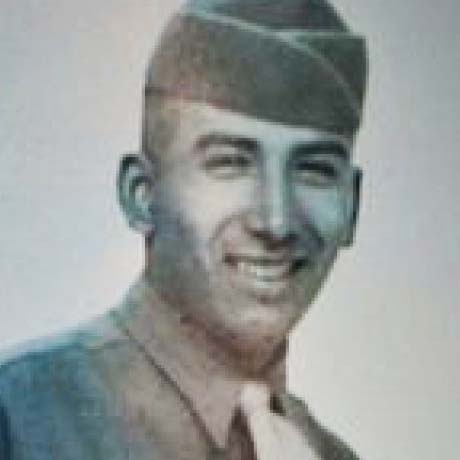
Staff Sergeant
Ysmael R. Villegas
1945: World War II
READ MOREYsmael R. Villegas
 1945: World War II
1945: World War II
Staff Sgt. Ysmael Villegas was a squad leader when his unit, in a forward position, clashed with an enemy strongly entrenched in connected caves and foxholes on commanding ground. He moved boldly from man to man, in the face of bursting grenades and demolition charges, through heavy machine-gun and rifle fire, to bolster the spirit of his comrades. Inspired by his gallantry, his men pressed forward to the crest of the hill. Numerous enemy riflemen, refusing to flee, continued firing from their foxholes. Staff Sgt. Villegas, with complete disregard for his own safety and the bullets which kicked up the dirt at his feet, charged an enemy position and, firing at point-blank range, killed the Japanese in a foxhole. He rushed a second foxhole while bullets missed him by inches and killed one more of the enemy. In rapid succession he charged a third, a fourth, a fifth foxhole, each time destroying the enemy within. The fire against him increased in intensity, but he pressed onward to attack a sixth position. As he neared his goal, he was hit and killed by enemy fire. Through his heroism and indomitable fighting spirit, Staff Sgt. Villegas, at the cost of his life, inspired his men to a determined attack in which they swept the enemy from the field.
Related Articles
Official page - Congressional Medal of Honor Society
Staff Sergeant Ysmael R. Villegas
1945: World War II
Staff Sgt. Ysmael Villegas was a squad leader when his unit, in a forward position, clashed with an enemy strongly entrenched in connected caves and foxholes on commanding ground. He moved boldly from man to man, in the face of bursting grenades and demolition charges, through heavy machine-gun and rifle fire, to bolster the spirit of his comrades. Inspired by his gallantry, his men pressed forward to the crest of the hill. Numerous enemy riflemen, refusing to flee, continued firing from their foxholes. Staff Sgt. Villegas, with complete disregard for his own safety and the bullets which kicked up the dirt at his feet, charged an enemy position and, firing at point-blank range, killed the Japanese in a foxhole. He rushed a second foxhole while bullets missed him by inches and killed one more of the enemy. In rapid succession he charged a third, a fourth, a fifth foxhole, each time destroying the enemy within. The fire against him increased in intensity, but he pressed onward to attack a sixth position. As he neared his goal, he was hit and killed by enemy fire. Through his heroism and indomitable fighting spirit, Staff Sgt. Villegas, at the cost of his life, inspired his men to a determined attack in which they swept the enemy from the field.
Related Articles
Official page - Congressional Medal of Honor Society
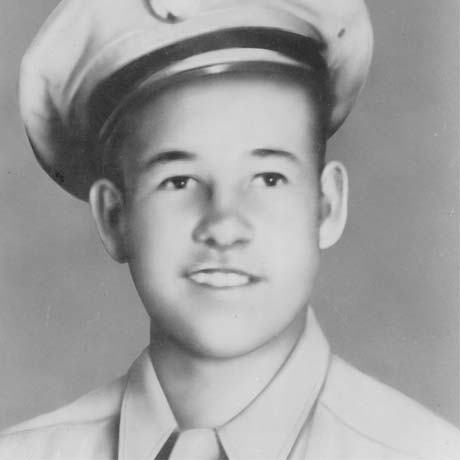
Private First Class
Jose F. Valdez
1945: World War II
READ MOREJose F. Valdez
 1945: World War II
1945: World War II
Pfc. Jose Valdez was on outpost duty with five others when the enemy counterattacked with overwhelming strength. From his position near some woods 500 yards beyond the American lines he observed a hostile tank about 75 yards away, and raked it with automatic rifle fire until it withdrew. Soon afterward he saw three Germans stealthily approaching through the woods. Scorning cover as the enemy soldiers opened up with heavy automatic-weapon fire from a range of 30 yards, he engaged in a firefight with the attackers until he had killed all three. The enemy quickly launched an attack with two full companies of infantrymen, blasting the patrol with murderous concentrations of automatic and rifle fire and beginning an encircling movement which forced the patrol leader to order a withdrawal. Despite the terrible odds, Pfc. Valdez immediately volunteered to cover the maneuver, and as the patrol one by one plunged through a hail of bullets toward the American lines, he fired burst after burst into the swarming enemy. Three of his companions were wounded in their dash for safety and he was struck by a bullet that entered his stomach and, passing through his body, emerged from his back. Overcoming agonizing pain, he regained control of himself and resumed his firing position, delivering a protective screen of bullets until all others of the patrol were safe. By field telephone he called for artillery and mortar fire on the Germans and corrected the range until he had shells falling within 50 yards of his position. For 15 minutes he refused to be dislodged by more than 200 of the enemy; then, seeing that the barrage had broken the counterattack, he dragged himself back to his own lines. He died later as a result of his wounds. Through his valiant, intrepid stand and at the cost of his own life, Pfc. Valdez made it possible for his comrades to escape, and was directly responsible for repulsing an attack by vastly superior enemy forces.
Related Articles
Official page - Congressional Medal of Honor Society
Private First Class Jose F. Valdez
1945: World War II
Pfc. Jose Valdez was on outpost duty with five others when the enemy counterattacked with overwhelming strength. From his position near some woods 500 yards beyond the American lines he observed a hostile tank about 75 yards away, and raked it with automatic rifle fire until it withdrew. Soon afterward he saw three Germans stealthily approaching through the woods. Scorning cover as the enemy soldiers opened up with heavy automatic-weapon fire from a range of 30 yards, he engaged in a firefight with the attackers until he had killed all three. The enemy quickly launched an attack with two full companies of infantrymen, blasting the patrol with murderous concentrations of automatic and rifle fire and beginning an encircling movement which forced the patrol leader to order a withdrawal. Despite the terrible odds, Pfc. Valdez immediately volunteered to cover the maneuver, and as the patrol one by one plunged through a hail of bullets toward the American lines, he fired burst after burst into the swarming enemy. Three of his companions were wounded in their dash for safety and he was struck by a bullet that entered his stomach and, passing through his body, emerged from his back. Overcoming agonizing pain, he regained control of himself and resumed his firing position, delivering a protective screen of bullets until all others of the patrol were safe. By field telephone he called for artillery and mortar fire on the Germans and corrected the range until he had shells falling within 50 yards of his position. For 15 minutes he refused to be dislodged by more than 200 of the enemy; then, seeing that the barrage had broken the counterattack, he dragged himself back to his own lines. He died later as a result of his wounds. Through his valiant, intrepid stand and at the cost of his own life, Pfc. Valdez made it possible for his comrades to escape, and was directly responsible for repulsing an attack by vastly superior enemy forces.
Related Articles
Official page - Congressional Medal of Honor Society
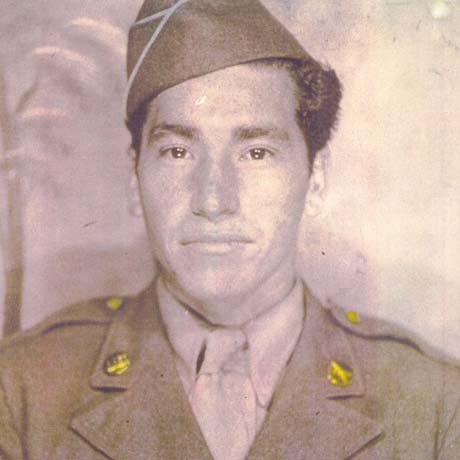
Private First Class
David M. Gonzales
1945: World War II
READ MOREDavid M. Gonzales
 1945: World War II
1945: World War II
Pfc. David Gonzales was pinned down with his company. As enemy fire swept the area, making any movement extremely hazardous, a 500-pound bomb smashed into the company's perimeter, burying five men with its explosion. Pfc. Gonzales, without hesitation, seized an entrenching tool and under a hail of fire crawled 15 yards to his entombed comrades, where his commanding officer, who had also rushed forward, was beginning to dig the men out. Nearing his goal, he saw the officer struck and instantly killed by machine-gun fire. Undismayed, he set to work swiftly and surely with his hands and entrenching tool while enemy sniper and machine-gun bullets struck all about him. He succeeded in digging one of the men out of the pile of rock and sand. To dig faster he stood up regardless of the greater danger from so exposing himself. He extricated a second man, and then another. As he completed the liberation of the third, he was hit and mortally wounded, but the comrades for whom he so gallantly gave his life were safely evacuated. Pfc. Gonzales' valiant and intrepid conduct exemplifies the highest traditions of the military service.
Related Articles
Official page - Congressional Medal of Honor Society
Private First Class David M. Gonzales
1945: World War II
Pfc. David Gonzales was pinned down with his company. As enemy fire swept the area, making any movement extremely hazardous, a 500-pound bomb smashed into the company's perimeter, burying five men with its explosion. Pfc. Gonzales, without hesitation, seized an entrenching tool and under a hail of fire crawled 15 yards to his entombed comrades, where his commanding officer, who had also rushed forward, was beginning to dig the men out. Nearing his goal, he saw the officer struck and instantly killed by machine-gun fire. Undismayed, he set to work swiftly and surely with his hands and entrenching tool while enemy sniper and machine-gun bullets struck all about him. He succeeded in digging one of the men out of the pile of rock and sand. To dig faster he stood up regardless of the greater danger from so exposing himself. He extricated a second man, and then another. As he completed the liberation of the third, he was hit and mortally wounded, but the comrades for whom he so gallantly gave his life were safely evacuated. Pfc. Gonzales' valiant and intrepid conduct exemplifies the highest traditions of the military service.
Related Articles
Official page - Congressional Medal of Honor Society
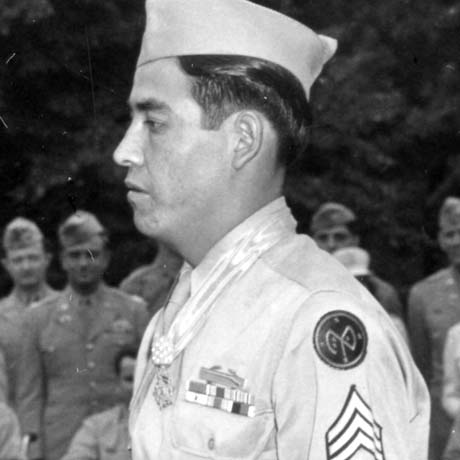
Private First Class
Alejandro R. Ruiz
1945: World War II
READ MOREAlejandro R. Ruiz
 1945: World War II
1945: World War II
When then-Pfc. Alejandro Ruiz's unit was stopped by a skillfully camouflaged enemy pillbox, he displayed conspicuous gallantry and intrepidity above and beyond the call of duty. His squad, suddenly brought under a hail of machine-gun fire and a vicious grenade attack, was pinned down. Jumping to his feet, Pfc. Ruiz seized an automatic rifle and lunged through the flying grenades and rifle and automatic fire for the top of the emplacement. When an enemy soldier charged him, his rifle jammed. Undaunted, Pfc. Ruiz whirled on his assailant and clubbed him down. Then he ran back through bullets and grenades, seized more ammunition and another automatic rifle, and again made for the pillbox. Enemy fire now was concentrated on him, but he charged on, miraculously reaching the position, and in plain view he climbed to the top. Leaping from one opening to another, he sent burst after burst into the pillbox, killing 12 of the enemy and completely destroying the position. Pfc. Ruiz's heroic conduct, in the face of overwhelming odds, saved the lives of many comrades and eliminated an obstacle that long would have checked his unit's advance
Related Articles
Official page - Congressional Medal of Honor Society
Private First Class Alejandro R. Ruiz
1945: World War II
When then-Pfc. Alejandro Ruiz's unit was stopped by a skillfully camouflaged enemy pillbox, he displayed conspicuous gallantry and intrepidity above and beyond the call of duty. His squad, suddenly brought under a hail of machine-gun fire and a vicious grenade attack, was pinned down. Jumping to his feet, Pfc. Ruiz seized an automatic rifle and lunged through the flying grenades and rifle and automatic fire for the top of the emplacement. When an enemy soldier charged him, his rifle jammed. Undaunted, Pfc. Ruiz whirled on his assailant and clubbed him down. Then he ran back through bullets and grenades, seized more ammunition and another automatic rifle, and again made for the pillbox. Enemy fire now was concentrated on him, but he charged on, miraculously reaching the position, and in plain view he climbed to the top. Leaping from one opening to another, he sent burst after burst into the pillbox, killing 12 of the enemy and completely destroying the position. Pfc. Ruiz's heroic conduct, in the face of overwhelming odds, saved the lives of many comrades and eliminated an obstacle that long would have checked his unit's advance
Related Articles
Official page - Congressional Medal of Honor Society
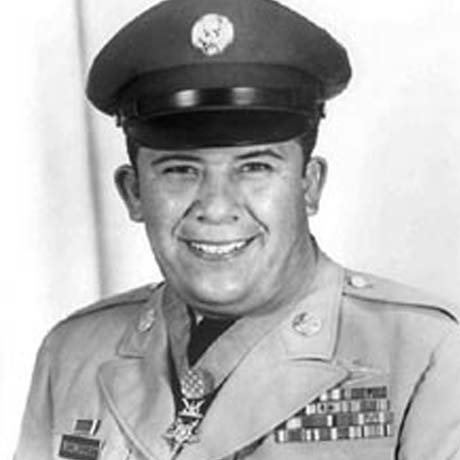
Private
Cleto L. Rodriguez
1945: World War II
READ MORECleto L. Rodriguez
 1945: World War II
1945: World War II
Then-Pvt. Cleto Rodriguez was an automatic rifleman when his unit attacked the strongly defended Paco Railroad Station during the battle for Manila, Philippine Islands. While making a frontal assault across an open field, his platoon was halted 100 yards from the station by intense enemy fire. On his own initiative, he left the platoon, accompanied by a comrade, and continued forward to a house 60 yards from the objective. Although under constant enemy observation, the two men remained in this position for an hour, firing at targets of opportunity, killing more than 35 hostile soldiers, and wounding many more. Moving closer to the station and discovering a group of Japanese replacements attempting to reach pillboxes, they opened heavy fire, killed more than 40, and stopped all subsequent attempts to man the emplacements. Enemy fire became more intense as they advanced to within 20 yards of the station. Then, covered by his companion, Pvt. Rodriguez boldly moved up to the building and threw five grenades through a doorway, killing seven Japanese, destroying a 20-mm gun, and wrecking a heavy machine gun. With their ammunition running low, the two men started to return to the American lines, alternately providing covering fire for each other's withdrawal. During this movement, Pvt. Rodriguez' companion was killed. In 2 and one half hours of fierce fighting the intrepid team killed more than 82 Japanese, completely disorganized their defense, and paved the way for the subsequent overwhelming defeat of the enemy at this strongpoint. Two days later, Pvt. Rodriguez again enabled his comrades to advance when he singlehandedly killed six Japanese and destroyed a well-placed 20-mm gun. By his outstanding skill with his weapon, gallant determination to destroy the enemy, and heroic courage in the face of tremendous odds, Pvt. Rodriguez, on two occasions, materially aided the advance of our troops in Manila.
Related Articles
Official page - Congressional Medal of Honor Society
Private Cleto L. Rodriguez
1945: World War II
Then-Pvt. Cleto Rodriguez was an automatic rifleman when his unit attacked the strongly defended Paco Railroad Station during the battle for Manila, Philippine Islands. While making a frontal assault across an open field, his platoon was halted 100 yards from the station by intense enemy fire. On his own initiative, he left the platoon, accompanied by a comrade, and continued forward to a house 60 yards from the objective. Although under constant enemy observation, the two men remained in this position for an hour, firing at targets of opportunity, killing more than 35 hostile soldiers, and wounding many more. Moving closer to the station and discovering a group of Japanese replacements attempting to reach pillboxes, they opened heavy fire, killed more than 40, and stopped all subsequent attempts to man the emplacements. Enemy fire became more intense as they advanced to within 20 yards of the station. Then, covered by his companion, Pvt. Rodriguez boldly moved up to the building and threw five grenades through a doorway, killing seven Japanese, destroying a 20-mm gun, and wrecking a heavy machine gun. With their ammunition running low, the two men started to return to the American lines, alternately providing covering fire for each other's withdrawal. During this movement, Pvt. Rodriguez' companion was killed. In 2 and one half hours of fierce fighting the intrepid team killed more than 82 Japanese, completely disorganized their defense, and paved the way for the subsequent overwhelming defeat of the enemy at this strongpoint. Two days later, Pvt. Rodriguez again enabled his comrades to advance when he singlehandedly killed six Japanese and destroyed a well-placed 20-mm gun. By his outstanding skill with his weapon, gallant determination to destroy the enemy, and heroic courage in the face of tremendous odds, Pvt. Rodriguez, on two occasions, materially aided the advance of our troops in Manila.
Related Articles
Official page - Congressional Medal of Honor Society
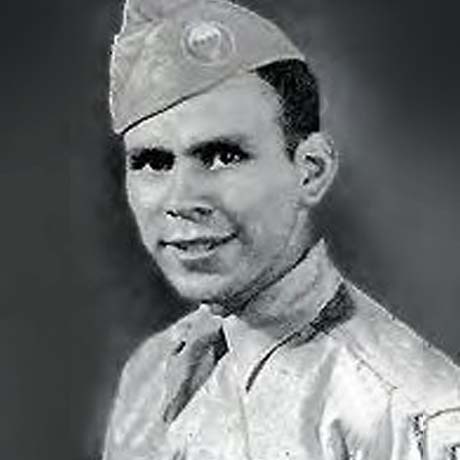
Private First Class
Manuel Perez Jr.
1945: World War II
READ MOREManuel Perez Jr.
 1945: World War II
1945: World War II
Pfc. Manuel Perez Jr. was lead scout for Company A, which had destroyed 11 of 12 pillboxes in a strongly fortified sector defending the approach to enemy-held Fort William McKinley on Luzon, Philippine Islands. In the reduction of these pillboxes, he killed five Japanese in the open and blasted others in pillboxes with grenades. Realizing the urgent need for taking the last emplacement, which contained two twin-mount .50-caliber dual-purpose machine guns, he took a circuitous route to within 20 yards of the position, killing four of the enemy in his advance. He threw a grenade into the pillbox, and, as the crew started withdrawing through a tunnel just to the rear of the emplacement, shot and killed four before exhausting his clip. He had reloaded and killed four more when an escaping Jap threw his rifle with fixed bayonet at him. In warding off this thrust, his own rifle was knocked to the ground. Seizing the Jap rifle, he continued firing, killing two more of the enemy. He rushed the remaining Japanese, killed three of them with the butt of the rifle, and entered the pillbox, where he bayoneted the one surviving hostile soldier. Singlehandedly, he killed 18 of the enemy in neutralizing the position that had held up the advance of his entire company. Through his courageous determination and heroic disregard of grave danger, Pfc. Perez made possible the successful advance of his unit toward a valuable objective and provided a lasting inspiration for his comrades.
Related Articles
Official page - Congressional Medal of Honor Society
Private First Class Manuel Perez Jr.
1945: World War II
Pfc. Manuel Perez Jr. was lead scout for Company A, which had destroyed 11 of 12 pillboxes in a strongly fortified sector defending the approach to enemy-held Fort William McKinley on Luzon, Philippine Islands. In the reduction of these pillboxes, he killed five Japanese in the open and blasted others in pillboxes with grenades. Realizing the urgent need for taking the last emplacement, which contained two twin-mount .50-caliber dual-purpose machine guns, he took a circuitous route to within 20 yards of the position, killing four of the enemy in his advance. He threw a grenade into the pillbox, and, as the crew started withdrawing through a tunnel just to the rear of the emplacement, shot and killed four before exhausting his clip. He had reloaded and killed four more when an escaping Jap threw his rifle with fixed bayonet at him. In warding off this thrust, his own rifle was knocked to the ground. Seizing the Jap rifle, he continued firing, killing two more of the enemy. He rushed the remaining Japanese, killed three of them with the butt of the rifle, and entered the pillbox, where he bayoneted the one surviving hostile soldier. Singlehandedly, he killed 18 of the enemy in neutralizing the position that had held up the advance of his entire company. Through his courageous determination and heroic disregard of grave danger, Pfc. Perez made possible the successful advance of his unit toward a valuable objective and provided a lasting inspiration for his comrades.
Related Articles
Official page - Congressional Medal of Honor Society
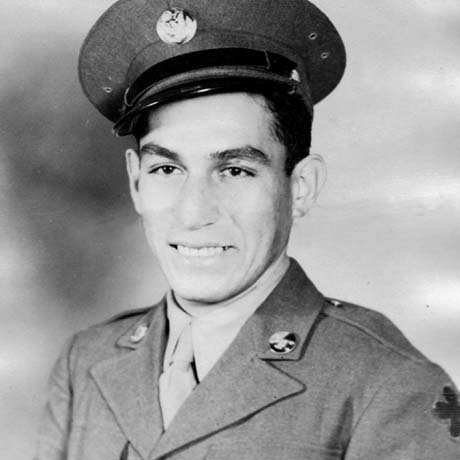
Staff Sergeant
Manuel V. Mendoza
1944: World War II
READ MOREManuel V. Mendoza
 1944: World War II
1944: World War II
Staff Sgt. Manuel V. Mendoza distinguished himself by acts of gallantry and intrepidity above and beyond the call of duty while serving as a Platoon Sergeant with Company B, 350th Infantry, 88th Infantry Division during combat operations against an armed enemy on Mt. Battaglia, Italy on October 4, 1944. That afternoon, the enemy launched a violent counterattack preceded by a heavy mortar barrage. Staff Sgt. Mendoza, already wounded in the arm and leg, grabbed a Thompson sub-machinegun and ran to the crest of the hill where he saw approximately 200 enemy troops charging up the slopes employing flame-throwers, machine pistols, rifles, and hand grenades. Staff Sgt. Mendoza immediately began to engage the enemy, firing five clips and killing ten enemy soldiers. After exhausting his ammunition, he picked up a carbine and emptied its magazine at the enemy. By this time, an enemy soldier with a flame-thrower had almost reached the crest, but was quickly eliminated as Staff Sgt. Mendoza drew his pistol and fired. Seeing that the enemy force continued to advance, Staff Sgt. Mendoza jumped into a machinegun emplacement that had just been abandoned and opened fire. Unable to engage the entire enemy force from his location, he picked up the machinegun and moved forward, firing from his hip and spraying a withering hail of bullets into the oncoming enemy, causing them to break into confusion. He then set the machinegun on the ground and continued to fire until the gun jammed. Without hesitating, Staff Sgt. Mendoza began throwing hand grenades at the enemy, causing them to flee. After the enemy had withdrawn, he advanced down the forward slope of the hill, retrieved numerous enemy weapons scattered about the area, captured a wounded enemy soldier, and returned to consolidate friendly positions with all available men. Staff Sgt. Mendoza's gallant stand resulted in thirty German soldiers killed and the successful defense of the hill. Staff Sgt. Mendoza's extraordinary heroism and selflessness above and beyond the call of duty are in keeping with the highest traditions of military service and reflect great credit upon himself, his unit and the United States Army.
Related Articles
Official page - Congressional Medal of Honor Society
Staff Sergeant Manuel V. Mendoza
1944: World War II
Staff Sgt. Manuel V. Mendoza distinguished himself by acts of gallantry and intrepidity above and beyond the call of duty while serving as a Platoon Sergeant with Company B, 350th Infantry, 88th Infantry Division during combat operations against an armed enemy on Mt. Battaglia, Italy on October 4, 1944. That afternoon, the enemy launched a violent counterattack preceded by a heavy mortar barrage. Staff Sgt. Mendoza, already wounded in the arm and leg, grabbed a Thompson sub-machinegun and ran to the crest of the hill where he saw approximately 200 enemy troops charging up the slopes employing flame-throwers, machine pistols, rifles, and hand grenades. Staff Sgt. Mendoza immediately began to engage the enemy, firing five clips and killing ten enemy soldiers. After exhausting his ammunition, he picked up a carbine and emptied its magazine at the enemy. By this time, an enemy soldier with a flame-thrower had almost reached the crest, but was quickly eliminated as Staff Sgt. Mendoza drew his pistol and fired. Seeing that the enemy force continued to advance, Staff Sgt. Mendoza jumped into a machinegun emplacement that had just been abandoned and opened fire. Unable to engage the entire enemy force from his location, he picked up the machinegun and moved forward, firing from his hip and spraying a withering hail of bullets into the oncoming enemy, causing them to break into confusion. He then set the machinegun on the ground and continued to fire until the gun jammed. Without hesitating, Staff Sgt. Mendoza began throwing hand grenades at the enemy, causing them to flee. After the enemy had withdrawn, he advanced down the forward slope of the hill, retrieved numerous enemy weapons scattered about the area, captured a wounded enemy soldier, and returned to consolidate friendly positions with all available men. Staff Sgt. Mendoza's gallant stand resulted in thirty German soldiers killed and the successful defense of the hill. Staff Sgt. Mendoza's extraordinary heroism and selflessness above and beyond the call of duty are in keeping with the highest traditions of military service and reflect great credit upon himself, his unit and the United States Army.
Related Articles
Official page - Congressional Medal of Honor Society
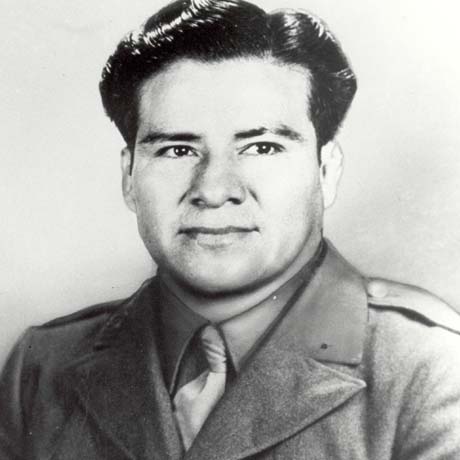
Private First Class
Jose M. Lopez
1944: World War II
READ MOREJose M. Lopez
 1944: World War II
1944: World War II
Then-Pfc. Jose Lopez, 23rd Infantry, near Krinkelt, Belgium, on December 17, 1944, on his own initiative, he carried his heavy machine gun from Company K's right flank to its left, in order to protect that flank, which was in danger of being overrun by advancing enemy infantry supported by tanks. Occupying a shallow hole offering no protection above the waist, he cut down a group of 10 Germans. Ignoring enemy fire from an advancing tank, he held his position and cut down 25 more enemy infantry attempting to turn his flank. Glancing to his right, he saw a large number of infantry swarming in from the front. Although dazed and shaken from enemy artillery fire which had crashed into the ground only a few yards away, he realized that his position soon would be outflanked.
Again, alone, he carried his machine gun to a position to the right rear of the sector; enemy tanks and infantry were forcing a withdrawal. Blown over backwards by the concussion of enemy fire, he immediately reset his gun and continued his fire. Singlehanded he held off the German horde until he was satisfied his company had effected its retirement. Again he loaded his gun on his back and in a hail of small-arms fire he ran to a point where a few of his comrades were attempting to set up another defense against the onrushing enemy. He fired from this position until his ammunition was exhausted. Still carrying his gun, he fell back with his small group to Krinkelt. Pfc. Lopez's gallantry and intrepidity, on seemingly suicidal missions in which he killed at least 100 of the enemy, were almost solely responsible for allowing Company K to avoid being enveloped, to withdraw successfully, and to give other forces coming up in support time to build a line which repelled the enemy drive. Lopez later retired at the rank of master sergeant.
Related Articles
Official page - Congressional Medal of Honor Society
Private First Class Jose M. Lopez
1944: World War II
Then-Pfc. Jose Lopez, 23rd Infantry, near Krinkelt, Belgium, on December 17, 1944, on his own initiative, he carried his heavy machine gun from Company K's right flank to its left, in order to protect that flank, which was in danger of being overrun by advancing enemy infantry supported by tanks. Occupying a shallow hole offering no protection above the waist, he cut down a group of 10 Germans. Ignoring enemy fire from an advancing tank, he held his position and cut down 25 more enemy infantry attempting to turn his flank. Glancing to his right, he saw a large number of infantry swarming in from the front. Although dazed and shaken from enemy artillery fire which had crashed into the ground only a few yards away, he realized that his position soon would be outflanked.
Again, alone, he carried his machine gun to a position to the right rear of the sector; enemy tanks and infantry were forcing a withdrawal. Blown over backwards by the concussion of enemy fire, he immediately reset his gun and continued his fire. Singlehanded he held off the German horde until he was satisfied his company had effected its retirement. Again he loaded his gun on his back and in a hail of small-arms fire he ran to a point where a few of his comrades were attempting to set up another defense against the onrushing enemy. He fired from this position until his ammunition was exhausted. Still carrying his gun, he fell back with his small group to Krinkelt. Pfc. Lopez's gallantry and intrepidity, on seemingly suicidal missions in which he killed at least 100 of the enemy, were almost solely responsible for allowing Company K to avoid being enveloped, to withdraw successfully, and to give other forces coming up in support time to build a line which repelled the enemy drive. Lopez later retired at the rank of master sergeant.
Related Articles
Official page - Congressional Medal of Honor Society
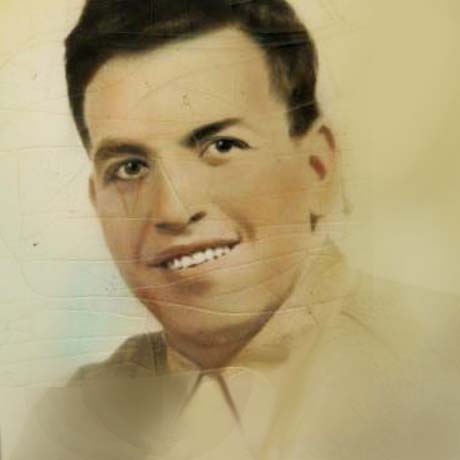
Private First Class
Salvador J. Lara
1944: World War II
READ MORESalvador J. Lara
 1944: World War II
1944: World War II
Pfc. Salvador J. Lara distinguished himself by acts of gallantry and intrepidity above and beyond the call of duty while serving as the Squad Leader of a rifle squad with 2d Platoon, Company L, 180th Infantry, 45th Infantry Division during combat operations against an armed enemy in Aprilia, Italy on May 27 and 28, 1944. On the afternoon of the 27th, Pfc. Lara aggressively led his rifle squad in neutralizing multiple enemy strongpoints and in inflicting large numbers of casualties on the enemy. Having taken his initial objective, Pfc. Lara noticed that the unit to his right was meeting stiff resistance from a large, well-entrenched enemy force in a deep ditch. Pfc. Lara quickly gathered three men and attacked a wide section of the enemy position, killing four, forcing fifteen others to surrender and causing two enemy mortar crews to abandon their weapons. His fearless and efficient performance enabled both his own unit and the unit to his right to continue to their objective. The next morning, as his company resumed the attack, Pfc. Lara sustained a severe leg wound, but did not stop to receive first aid. His company suffered heavy casualties as a result of withering machinegun fire coming from an enemy strongpoint on the right flank. After requesting permission to destroy the enemy machineguns armed only with a Browning Automatic Rifle, Pfc. Lara crawled alone toward the nearest machinegun. Despite his painful wound and the extreme danger of the task, he rose and fearlessly charged the nest, killing the crew members. Another machinegun opened fire on him, but he quickly neutralized this weapon with accurate fire from his Browning, killing three more of the enemy. His aggressive attack forced two other machinegun crews to flee their weapons. After rejoining his company, Pfc. Lara continued his exemplary performance until he captured his objective. Pfc. Lara's extraordinary heroism and selflessness above and beyond the call of duty are in keeping with the highest traditions of military service and reflect great credit upon himself, his unit and the United States Army.
Related Articles
Official page - Congressional Medal of Honor Society
Private First Class Salvador J. Lara
1944: World War II
Pfc. Salvador J. Lara distinguished himself by acts of gallantry and intrepidity above and beyond the call of duty while serving as the Squad Leader of a rifle squad with 2d Platoon, Company L, 180th Infantry, 45th Infantry Division during combat operations against an armed enemy in Aprilia, Italy on May 27 and 28, 1944. On the afternoon of the 27th, Pfc. Lara aggressively led his rifle squad in neutralizing multiple enemy strongpoints and in inflicting large numbers of casualties on the enemy. Having taken his initial objective, Pfc. Lara noticed that the unit to his right was meeting stiff resistance from a large, well-entrenched enemy force in a deep ditch. Pfc. Lara quickly gathered three men and attacked a wide section of the enemy position, killing four, forcing fifteen others to surrender and causing two enemy mortar crews to abandon their weapons. His fearless and efficient performance enabled both his own unit and the unit to his right to continue to their objective. The next morning, as his company resumed the attack, Pfc. Lara sustained a severe leg wound, but did not stop to receive first aid. His company suffered heavy casualties as a result of withering machinegun fire coming from an enemy strongpoint on the right flank. After requesting permission to destroy the enemy machineguns armed only with a Browning Automatic Rifle, Pfc. Lara crawled alone toward the nearest machinegun. Despite his painful wound and the extreme danger of the task, he rose and fearlessly charged the nest, killing the crew members. Another machinegun opened fire on him, but he quickly neutralized this weapon with accurate fire from his Browning, killing three more of the enemy. His aggressive attack forced two other machinegun crews to flee their weapons. After rejoining his company, Pfc. Lara continued his exemplary performance until he captured his objective. Pfc. Lara's extraordinary heroism and selflessness above and beyond the call of duty are in keeping with the highest traditions of military service and reflect great credit upon himself, his unit and the United States Army.
Related Articles
Official page - Congressional Medal of Honor Society
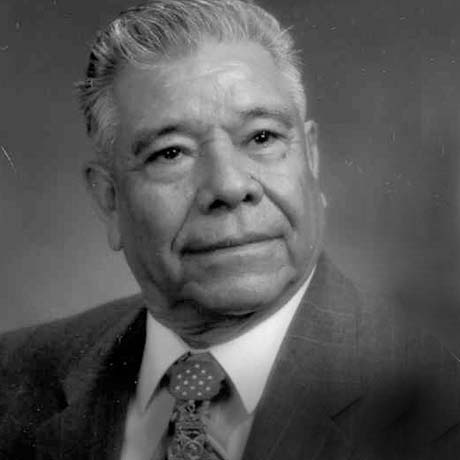
Private
Silvestre S. Herrera
1944: World War II
READ MORESilvestre S. Herrera
 1944: World War II
1944: World War II
Pvt. Silvestre Herrera advanced with a platoon along a wooded road until stopped by heavy enemy machine-gun fire. As the rest of the unit took cover, he made a one-man frontal assault on a strongpoint and captured eight enemy soldiers. When the platoon resumed its advance and was subjected to fire from a second emplacement beyond an extensive minefield, Pvt. Herrera again moved forward, disregarding the danger of exploding mines, to attack the position. He stepped on a mine and had both feet severed; but, despite intense pain and unchecked loss of blood, he pinned down the enemy with accurate rifle fire while a friendly squad captured the enemy gun by skirting the minefield and rushing in from the flank. The magnificent courage, extraordinary heroism, and willing self-sacrifice displayed by Pvt. Herrera resulted in the capture of two enemy strongpoints and the taking of eight prisoners.
Related Articles
Official page - Congressional Medal of Honor Society
Private Silvestre S. Herrera
1944: World War II
Pvt. Silvestre Herrera advanced with a platoon along a wooded road until stopped by heavy enemy machine-gun fire. As the rest of the unit took cover, he made a one-man frontal assault on a strongpoint and captured eight enemy soldiers. When the platoon resumed its advance and was subjected to fire from a second emplacement beyond an extensive minefield, Pvt. Herrera again moved forward, disregarding the danger of exploding mines, to attack the position. He stepped on a mine and had both feet severed; but, despite intense pain and unchecked loss of blood, he pinned down the enemy with accurate rifle fire while a friendly squad captured the enemy gun by skirting the minefield and rushing in from the flank. The magnificent courage, extraordinary heroism, and willing self-sacrifice displayed by Pvt. Herrera resulted in the capture of two enemy strongpoints and the taking of eight prisoners.
Related Articles
Official page - Congressional Medal of Honor Society
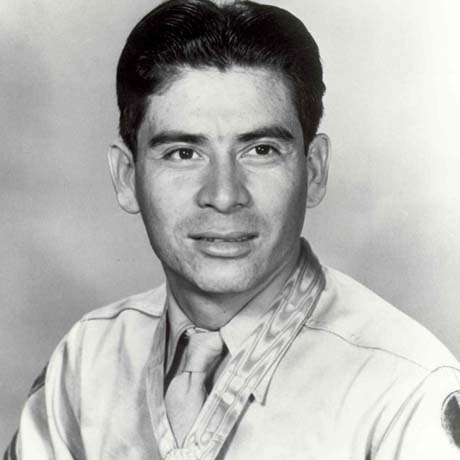
Staff Sergeant
Marcario Garcia
1944: World War II
READ MOREMarcario Garcia
 1944: World War II
1944: World War II
While an acting squad leader of Company B, 22d Infantry, on 27 November 1944, near Grosshau, Germany, then-Pvt. Marcario Garcia singlehandedly assaulted two enemy machine-gun emplacements. Attacking prepared positions on a wooded hill, which could be approached only through meager cover, his company was pinned down by intense machine-gun fire and subjected to a concentrated artillery and mortar barrage. Although painfully wounded, he refused to be evacuated and on his own initiative crawled forward alone until he reached a position near an enemy emplacement. Hurling grenades, he boldly assaulted the position, destroyed the gun, and with his rifle killed three of the enemy who attempted to escape. When he rejoined his company, a second machine gun opened fire and again the intrepid soldier went forward, utterly disregarding his own safety. He stormed the position and destroyed the gun, killed three more Germans, and captured four prisoners. He fought on with his unit until the objective was taken and only then did he permit himself to be removed for medical care. Pvt. Garcia's conspicuous heroism, his inspiring, courageous conduct, and his complete disregard for his personal safety wiped out two enemy emplacements and enabled his company to advance and secure its objective. Marcario later retired at the rank of staff sergeant.
Related Articles
Official page - Congressional Medal of Honor Society
Staff Sergeant Marcario Garcia
1944: World War II
While an acting squad leader of Company B, 22d Infantry, on 27 November 1944, near Grosshau, Germany, then-Pvt. Marcario Garcia singlehandedly assaulted two enemy machine-gun emplacements. Attacking prepared positions on a wooded hill, which could be approached only through meager cover, his company was pinned down by intense machine-gun fire and subjected to a concentrated artillery and mortar barrage. Although painfully wounded, he refused to be evacuated and on his own initiative crawled forward alone until he reached a position near an enemy emplacement. Hurling grenades, he boldly assaulted the position, destroyed the gun, and with his rifle killed three of the enemy who attempted to escape. When he rejoined his company, a second machine gun opened fire and again the intrepid soldier went forward, utterly disregarding his own safety. He stormed the position and destroyed the gun, killed three more Germans, and captured four prisoners. He fought on with his unit until the objective was taken and only then did he permit himself to be removed for medical care. Pvt. Garcia's conspicuous heroism, his inspiring, courageous conduct, and his complete disregard for his personal safety wiped out two enemy emplacements and enabled his company to advance and secure its objective. Marcario later retired at the rank of staff sergeant.
Related Articles
Official page - Congressional Medal of Honor Society
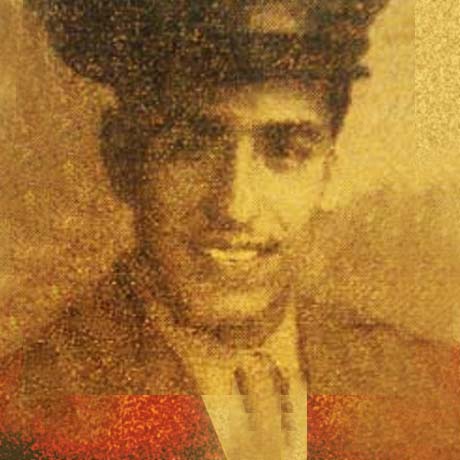
Private
Joe Gandara
1944: World War II
READ MOREJoe Gandara
 1944: World War II
1944: World War II
Pvt. Joe Gandara distinguished himself by acts of gallantry and intrepidity above and beyond the call of duty while serving with Company D, 2d Battalion, 507th Parachute Infantry Regiment, 17th Airborne Division during combat operations against an armed enemy in Amfreville, France on June 9, 1944. On that day, Pvt. Gandara's detachment came under devastating enemy fire from a strong German force, pinning the men to the ground for a period of four hours. Pvt. Gandara voluntarily advanced alone toward the enemy position. Firing his machinegun from his hip as he moved forward, he destroyed three hostile machineguns before he was fatally wounded. Pvt. Gandara's extraordinary heroism and selflessness at the cost of his own life, above and beyond the call of duty, are in keeping with the highest traditions of military service and reflect great credit upon himself, his unit and the United States Army.
Related Articles
Official page - Congressional Medal of Honor Society
Private Joe Gandara
1944: World War II
Pvt. Joe Gandara distinguished himself by acts of gallantry and intrepidity above and beyond the call of duty while serving with Company D, 2d Battalion, 507th Parachute Infantry Regiment, 17th Airborne Division during combat operations against an armed enemy in Amfreville, France on June 9, 1944. On that day, Pvt. Gandara's detachment came under devastating enemy fire from a strong German force, pinning the men to the ground for a period of four hours. Pvt. Gandara voluntarily advanced alone toward the enemy position. Firing his machinegun from his hip as he moved forward, he destroyed three hostile machineguns before he was fatally wounded. Pvt. Gandara's extraordinary heroism and selflessness at the cost of his own life, above and beyond the call of duty, are in keeping with the highest traditions of military service and reflect great credit upon himself, his unit and the United States Army.
Related Articles
Official page - Congressional Medal of Honor Society
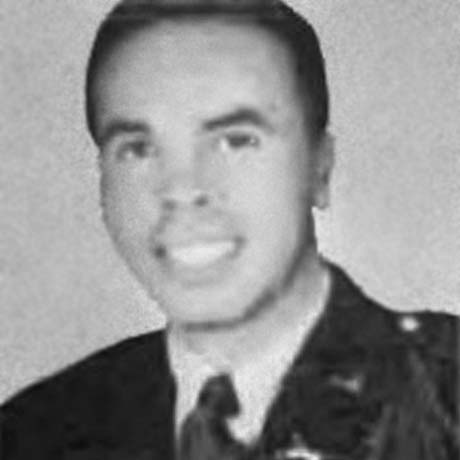
Staff Sergeant
Rudolph B. Davila
1944: World War II
READ MORERudolph B. Davila
 1944: World War II
1944: World War II
Staff Sgt. Rudolph Davila was awarded the Medal of Honor for conspicuous gallantry and intrepidity at the risk of his life above and beyond the call of duty. Staff Sgt. Rudolph B. Davila distinguished himself by extraordinary heroism in action, on 28 May 1944, near Artena, Italy. During the offensive which broke through the German mountain strongholds surrounding the Anzio beachhead, Staff Sgt. Davila risked death to provide heavy weapons support for a beleaguered rifle company. Caught on an exposed hillside by heavy, grazing fire from a well-entrenched German force, his machine gunners were reluctant to risk putting their guns into action. Crawling fifty yards to the nearest machine gun, Staff Sgt. Davila set it up alone and opened fire on the enemy. In order to observe the effect of his fire, Sergeant Davila fired from the kneeling position, ignoring the enemy fire that struck the tripod and passed between his legs. Ordering a gunner to take cover, he crawled forward to a vantage point and directed the firefight with hand and arm signals until both hostile machine guns were silenced. Bringing his three remaining machine guns into action, he drove the enemy to a reserve position two hundreds yards to the rear. When he received a painful wound in the leg, he dashed to a burned tank and, despite the crash of bullets on the hull, engaged a second enemy force from the tank's turret. Dismounting, he advanced 130 yards in short rushes, crawled 20 yards and charged into an enemy -held house to eliminate the defending force of five with a hand grenade and rifle fire. Climbing to the attic, he straddled a large shell hole in the wall and opened fire on the enemy. Although the walls of the house were crumbling, he continued to fire until he had destroyed two more machine guns. His intrepid actions brought desperately needed heavy weapons support to a hard-pressed rifle company and silenced four machine gunners, which forced the enemy to abandon their prepared positions. Staff Sgt. Davila's extraordinary heroism and devotion to duty are in keeping with the highest traditions of military service and reflect great credit on him, his unit, and the United State Army.
Related Articles
Official page - Congressional Medal of Honor Society
Staff Sergeant Rudolph B. Davila
1944: World War II
Staff Sgt. Rudolph Davila was awarded the Medal of Honor for conspicuous gallantry and intrepidity at the risk of his life above and beyond the call of duty. Staff Sgt. Rudolph B. Davila distinguished himself by extraordinary heroism in action, on 28 May 1944, near Artena, Italy. During the offensive which broke through the German mountain strongholds surrounding the Anzio beachhead, Staff Sgt. Davila risked death to provide heavy weapons support for a beleaguered rifle company. Caught on an exposed hillside by heavy, grazing fire from a well-entrenched German force, his machine gunners were reluctant to risk putting their guns into action. Crawling fifty yards to the nearest machine gun, Staff Sgt. Davila set it up alone and opened fire on the enemy. In order to observe the effect of his fire, Sergeant Davila fired from the kneeling position, ignoring the enemy fire that struck the tripod and passed between his legs. Ordering a gunner to take cover, he crawled forward to a vantage point and directed the firefight with hand and arm signals until both hostile machine guns were silenced. Bringing his three remaining machine guns into action, he drove the enemy to a reserve position two hundreds yards to the rear. When he received a painful wound in the leg, he dashed to a burned tank and, despite the crash of bullets on the hull, engaged a second enemy force from the tank's turret. Dismounting, he advanced 130 yards in short rushes, crawled 20 yards and charged into an enemy -held house to eliminate the defending force of five with a hand grenade and rifle fire. Climbing to the attic, he straddled a large shell hole in the wall and opened fire on the enemy. Although the walls of the house were crumbling, he continued to fire until he had destroyed two more machine guns. His intrepid actions brought desperately needed heavy weapons support to a hard-pressed rifle company and silenced four machine gunners, which forced the enemy to abandon their prepared positions. Staff Sgt. Davila's extraordinary heroism and devotion to duty are in keeping with the highest traditions of military service and reflect great credit on him, his unit, and the United State Army.
Related Articles
Official page - Congressional Medal of Honor Society
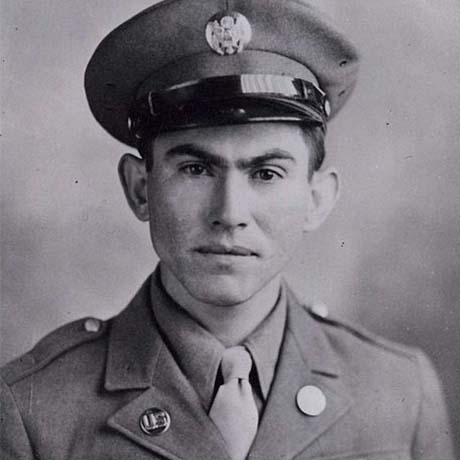
Private
Pedro Cano
1944: World War II
READ MOREPedro Cano
 1944: World War II
1944: World War II
Pvt. Pedro Cano distinguished himself by acts of gallantry and intrepidity above and beyond the call of duty while serving with Company C, 8th Infantry Regiment, 4th Infantry Division during combat operations against an armed enemy in Schevenhutte, Germany on December 2 and 3, 1944. On the afternoon of the 2nd, American infantrymen launched an attack against German emplacements but were repulsed by enemy machinegun fire. Armed with a rocket launcher, Pvt. Cano crawled through a densely mined area under heavy enemy fire and successfully reached a point within ten yards of the nearest emplacement. He quickly fired a rocket into the position, killing the two gunners and five supporting riflemen. Without hesitating, he fired into a second position, killing two more gunners, and proceeded to assault the position with hand grenades, killing several others and dispersing the rest. Then, when an adjacent company encountered heavy fire, Pvt. Cano crossed his company front, crept to within fifteen yards of the nearest enemy emplacement and killed the two machinegunners with a rocket. With another round he killed two more gunners and destroyed a second gun. On the following day, his company renewed the attack and again encountered heavy machinegun fire. Pvt. Cano, armed with his rocket launcher, again moved across fire-swept terrain and destroyed three enemy machineguns in succession, killing the six gunners. Pvt. Cano's extraordinary heroism and selflessness above and beyond the call of duty are in keeping with the highest traditions of military service and reflect great credit upon himself, his unit and the United States Army.
Related Articles
Official page - Congressional Medal of Honor Society
Private Pedro Cano
1944: World War II
Pvt. Pedro Cano distinguished himself by acts of gallantry and intrepidity above and beyond the call of duty while serving with Company C, 8th Infantry Regiment, 4th Infantry Division during combat operations against an armed enemy in Schevenhutte, Germany on December 2 and 3, 1944. On the afternoon of the 2nd, American infantrymen launched an attack against German emplacements but were repulsed by enemy machinegun fire. Armed with a rocket launcher, Pvt. Cano crawled through a densely mined area under heavy enemy fire and successfully reached a point within ten yards of the nearest emplacement. He quickly fired a rocket into the position, killing the two gunners and five supporting riflemen. Without hesitating, he fired into a second position, killing two more gunners, and proceeded to assault the position with hand grenades, killing several others and dispersing the rest. Then, when an adjacent company encountered heavy fire, Pvt. Cano crossed his company front, crept to within fifteen yards of the nearest enemy emplacement and killed the two machinegunners with a rocket. With another round he killed two more gunners and destroyed a second gun. On the following day, his company renewed the attack and again encountered heavy machinegun fire. Pvt. Cano, armed with his rocket launcher, again moved across fire-swept terrain and destroyed three enemy machineguns in succession, killing the six gunners. Pvt. Cano's extraordinary heroism and selflessness above and beyond the call of duty are in keeping with the highest traditions of military service and reflect great credit upon himself, his unit and the United States Army.
Related Articles
Official page - Congressional Medal of Honor Society
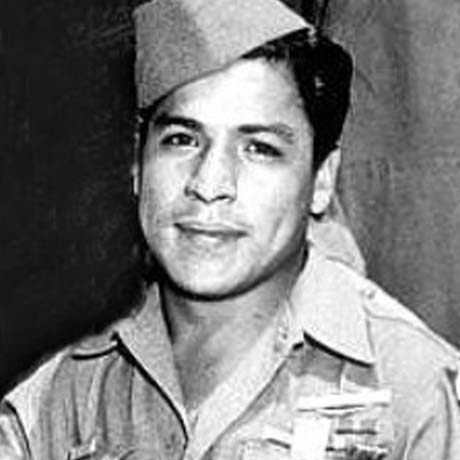
Staff Sergeant
Lucian Adams
1944: World War II
READ MORELucian Adams
 1944: World War II
1944: World War II
Staff Sgt. Lucian Adams was awarded the Medal of Honor for conspicuous gallantry and intrepidity at risk of his life above and beyond the call of duty on 28 October 1944, near St. Die, France. When his company was stopped in its effort to drive through the Mortagne Forest to reopen the supply line to the isolated third battalion, Staff Sgt. Adams braved the concentrated fire of machine guns in a lone assault on a force of German troops. Although his company had progressed less than 10 yards and had lost three killed and six wounded, Staff Sgt. Adams charged forward dodging from tree to tree firing a borrowed BAR from the hip. Despite intense machine-gun fire which the enemy directed at him and rifle grenades which struck the trees over his head, showering him with broken twigs and branches, Staff Sgt. Adams made his way to within 10 yards of the closest machine gun and killed the gunner with a hand grenade. An enemy soldier threw hand grenades at him from a position only 10 yards distant; however, Staff Sgt. Adams dispatched him with a single burst of BAR fire. Charging into the vortex of the enemy fire, he killed another machine gunner at 15 yards' range with a hand grenade and forced the surrender of two supporting infantrymen. Although the remainder of the German group concentrated the full force of its automatic-weapon fire in a desperate effort to knock him out, he proceeded through the woods to find and exterminate five more of the enemy. Finally, when the third German machine gun opened up on him at a range of 20 yards, Staff Sgt. Adams killed the gunner with BAR fire. In the course of the action, he personally killed nine Germans, eliminated three enemy machine guns, vanquished a specialized force which was armed with automatic weapons, and grenade launchers, cleared the woods of hostile elements and reopened the severed supply lines to the assault companies of his battalion.
Related Articles
Official page - Congressional Medal of Honor Society
Staff Sergeant Lucian Adams
1944: World War II
Staff Sgt. Lucian Adams was awarded the Medal of Honor for conspicuous gallantry and intrepidity at risk of his life above and beyond the call of duty on 28 October 1944, near St. Die, France. When his company was stopped in its effort to drive through the Mortagne Forest to reopen the supply line to the isolated third battalion, Staff Sgt. Adams braved the concentrated fire of machine guns in a lone assault on a force of German troops. Although his company had progressed less than 10 yards and had lost three killed and six wounded, Staff Sgt. Adams charged forward dodging from tree to tree firing a borrowed BAR from the hip. Despite intense machine-gun fire which the enemy directed at him and rifle grenades which struck the trees over his head, showering him with broken twigs and branches, Staff Sgt. Adams made his way to within 10 yards of the closest machine gun and killed the gunner with a hand grenade. An enemy soldier threw hand grenades at him from a position only 10 yards distant; however, Staff Sgt. Adams dispatched him with a single burst of BAR fire. Charging into the vortex of the enemy fire, he killed another machine gunner at 15 yards' range with a hand grenade and forced the surrender of two supporting infantrymen. Although the remainder of the German group concentrated the full force of its automatic-weapon fire in a desperate effort to knock him out, he proceeded through the woods to find and exterminate five more of the enemy. Finally, when the third German machine gun opened up on him at a range of 20 yards, Staff Sgt. Adams killed the gunner with BAR fire. In the course of the action, he personally killed nine Germans, eliminated three enemy machine guns, vanquished a specialized force which was armed with automatic weapons, and grenade launchers, cleared the woods of hostile elements and reopened the severed supply lines to the assault companies of his battalion.
Related Articles
Official page - Congressional Medal of Honor Society
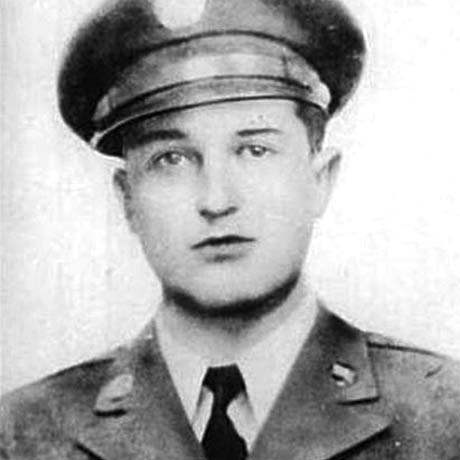
Private
Joe P. Martinez
1943: World War II
READ MOREJoe P. Martinez
 1943: World War II
1943: World War II
Pvt. Joe Martinez was awarded the Medal of Honor for conspicuous gallantry and intrepidity above and beyond the call of duty in action with the enemy. Over a period of several days, repeated efforts to drive the enemy from a key defensive position high in the snow-covered precipitous mountains between east arm of Holtz Bay and Chichogof Harbor had failed. On 26 May 1943, troop dispositions were readjusted and a trial coordinated attack on this position by a reinforced battalion was launched. Initially successful, the attack hesitated. In the face of severe hostile machine-gun, rifle, and mortar fire, Pvt. Martinez, an automatic rifleman, rose to his feet and resumed his advance. Occasionally he stopped to urge his comrades on. His example inspired others to follow. After a most difficult climb, Pvt. Martinez eliminated resistance from part of the enemy position by BAR fire and hand grenades, thus assisting the advance of other attacking elements. This success only partially completed the action. The main Holtz-Chichogof Pass rose about 150 feet higher, flanked by steep rocky ridges and reached a snow-filled defile. Passage was barred by enemy fire from either flank and from tiers of snow trenches in front. Despite these obstacles, and knowing of their existence, Pvt. Martinez again led the troops on and up, personally silencing several trenches with BAR fire and ultimately reaching the pass itself. Here, just below the knifelike rim of the pass, Pvt. Martinez encountered a final enemy-occupied trench and as he was engaged in firing into it he was mortally wounded. The pass, however, was taken and its capture was an important preliminary to the end of organized hostile resistance on the island.
Related Articles
Official page - Congressional Medal of Honor Society
Private Joe P. Martinez
1943: World War II
Pvt. Joe Martinez was awarded the Medal of Honor for conspicuous gallantry and intrepidity above and beyond the call of duty in action with the enemy. Over a period of several days, repeated efforts to drive the enemy from a key defensive position high in the snow-covered precipitous mountains between east arm of Holtz Bay and Chichogof Harbor had failed. On 26 May 1943, troop dispositions were readjusted and a trial coordinated attack on this position by a reinforced battalion was launched. Initially successful, the attack hesitated. In the face of severe hostile machine-gun, rifle, and mortar fire, Pvt. Martinez, an automatic rifleman, rose to his feet and resumed his advance. Occasionally he stopped to urge his comrades on. His example inspired others to follow. After a most difficult climb, Pvt. Martinez eliminated resistance from part of the enemy position by BAR fire and hand grenades, thus assisting the advance of other attacking elements. This success only partially completed the action. The main Holtz-Chichogof Pass rose about 150 feet higher, flanked by steep rocky ridges and reached a snow-filled defile. Passage was barred by enemy fire from either flank and from tiers of snow trenches in front. Despite these obstacles, and knowing of their existence, Pvt. Martinez again led the troops on and up, personally silencing several trenches with BAR fire and ultimately reaching the pass itself. Here, just below the knifelike rim of the pass, Pvt. Martinez encountered a final enemy-occupied trench and as he was engaged in firing into it he was mortally wounded. The pass, however, was taken and its capture was an important preliminary to the end of organized hostile resistance on the island.
Related Articles
Official page - Congressional Medal of Honor Society
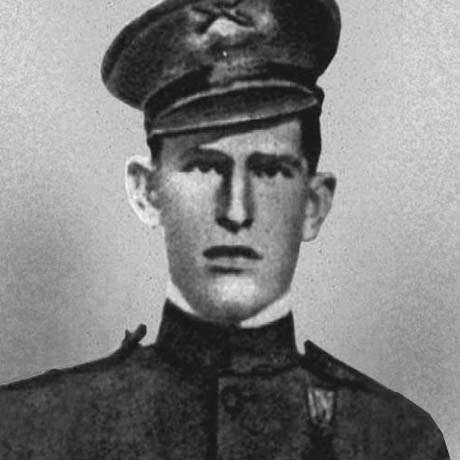
Private
David B. Barkeley
1918: World War I
READ MOREDavid B. Barkeley
 1918: World War I
1918: World War I
When information was desired as to the enemy's position on the opposite side of the Meuse River, Pvt. Barkeley, with another Soldier, volunteered without hesitation and swam the river to reconnoiter the exact location. He succeeded in reaching the opposite bank, despite the evident determination of the enemy to prevent a crossing. Having obtained his information, he again entered the water for his return, but before his goal was reached, he was seized with cramps and drowned.
Related Articles
Official page - Congressional Medal of Honor Society
Private David B. Barkeley
1918: World War I
When information was desired as to the enemy's position on the opposite side of the Meuse River, Pvt. Barkeley, with another Soldier, volunteered without hesitation and swam the river to reconnoiter the exact location. He succeeded in reaching the opposite bank, despite the evident determination of the enemy to prevent a crossing. Having obtained his information, he again entered the water for his return, but before his goal was reached, he was seized with cramps and drowned.
Related Articles
Official page - Congressional Medal of Honor Society
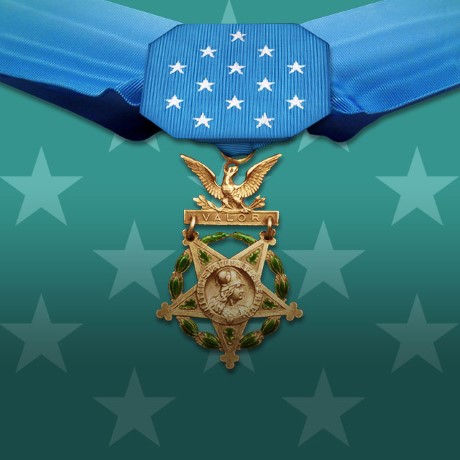
Corporal
Joseph H. De Castro
1863: Civil War
READ MOREJoseph H. De Castro
 1863: Civil War
1863: Civil War
Cpl. Joseph DeCastro was born in Boston, Massachusetts. Upon the outbreak of the Civil War, he was among the men who joined the all-volunteer 19th Massachusetts Infantry.Medal of Honor Citation: Capture of flag of 19th Virginia Regiment. He was awarded the Medal of Honor for his bravery during his regiment's attack and repulse of elements of Pickett's Charge on the Third Day of the Battle of Gettysburg, Pennsylvania, July 3, 1863.De Castro's medal was issued, December 1, 1864. He was one of seven 19th Massachusetts Infantry Soldiers to be awarded the Medal of Honor for bravery during the War.
Related Articles
Official page - Congressional Medal of Honor Society
Corporal Joseph H. De Castro
1863: Civil War
Cpl. Joseph DeCastro was born in Boston, Massachusetts. Upon the outbreak of the Civil War, he was among the men who joined the all-volunteer 19th Massachusetts Infantry.Medal of Honor Citation: Capture of flag of 19th Virginia Regiment. He was awarded the Medal of Honor for his bravery during his regiment's attack and repulse of elements of Pickett's Charge on the Third Day of the Battle of Gettysburg, Pennsylvania, July 3, 1863.De Castro's medal was issued, December 1, 1864. He was one of seven 19th Massachusetts Infantry Soldiers to be awarded the Medal of Honor for bravery during the War.
Related Articles
Official page - Congressional Medal of Honor Society